- Back to Home »
- Roundup: What to do about Syria
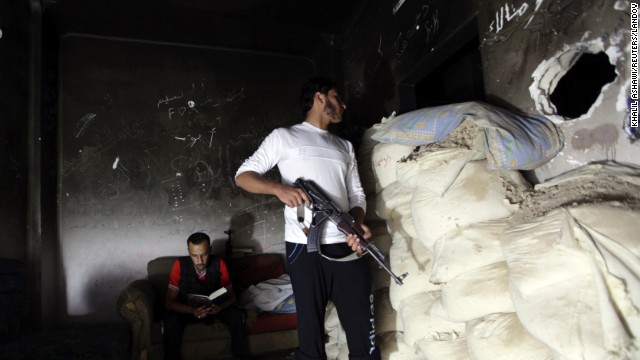 A Free Syrian Army fighter looks through a hole from behind sandbags, while a fellow fighter reads the Quran in Deir Ezzor, Syria, on Tuesday, September 3. The United States and other Western nations blame the Assad regime for a chemical weapons attack that's believed to have killed more than 1,400 people. Tensions in Syria began to flare in March 2011 and escalated into an ongoing civil war. Click through to view the most compelling images taken since the start of the conflict:
A Free Syrian Army fighter looks through a hole from behind sandbags, while a fellow fighter reads the Quran in Deir Ezzor, Syria, on Tuesday, September 3. The United States and other Western nations blame the Assad regime for a chemical weapons attack that's believed to have killed more than 1,400 people. Tensions in Syria began to flare in March 2011 and escalated into an ongoing civil war. Click through to view the most compelling images taken since the start of the conflict: 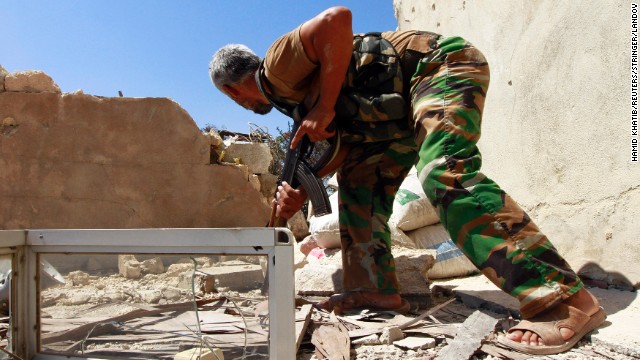 A Free Syrian Army fighter takes cover as he watches forces loyal to President Bashar al-Assad near Hanano barracks in Aleppo on September 3.
A Free Syrian Army fighter takes cover as he watches forces loyal to President Bashar al-Assad near Hanano barracks in Aleppo on September 3. 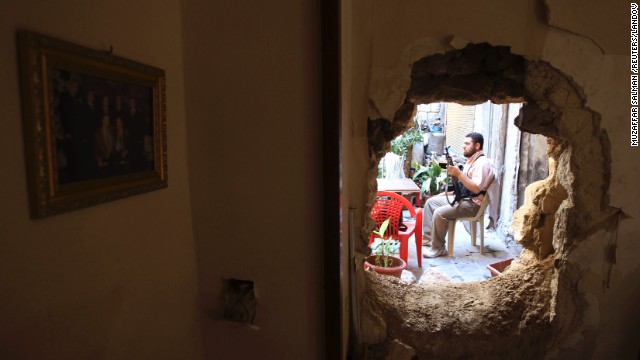 A Free Syrian Army fighter is seen through a hole in a wall of a building in Aleppo on September 3.
A Free Syrian Army fighter is seen through a hole in a wall of a building in Aleppo on September 3. 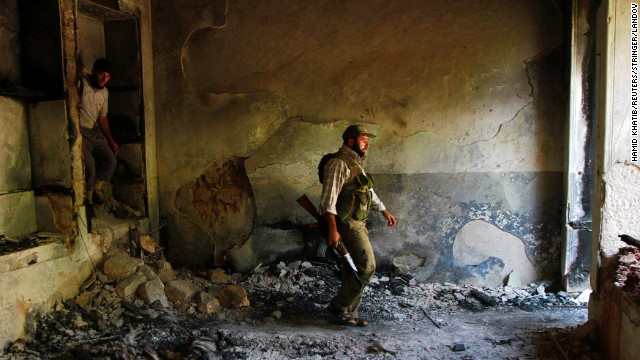 Free Syrian Army fighters walk inside a damaged house in Aleppo on September 3.
Free Syrian Army fighters walk inside a damaged house in Aleppo on September 3. 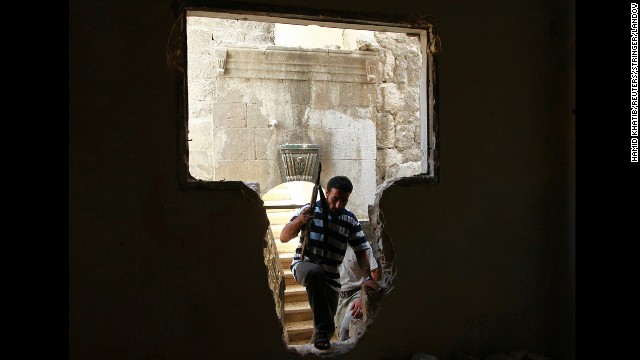 A Free Syrian Army fighter walks through a hole in a wall in Aleppo on September 3.
A Free Syrian Army fighter walks through a hole in a wall in Aleppo on September 3. 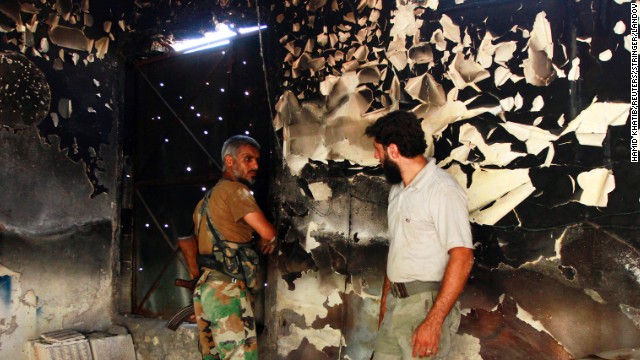 Free Syrian Army fighters talk inside a burnt house in Aleppo on September 3.
Free Syrian Army fighters talk inside a burnt house in Aleppo on September 3. 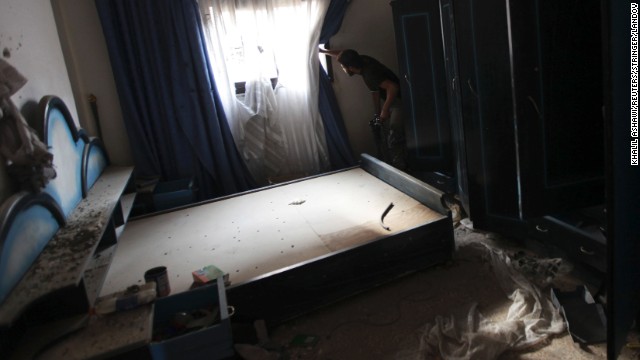 A Free Syrian Army fighter peeks through the curtains of a bedroom in Deir ez-Zor, Syria, on Monday, September 2.
A Free Syrian Army fighter peeks through the curtains of a bedroom in Deir ez-Zor, Syria, on Monday, September 2. 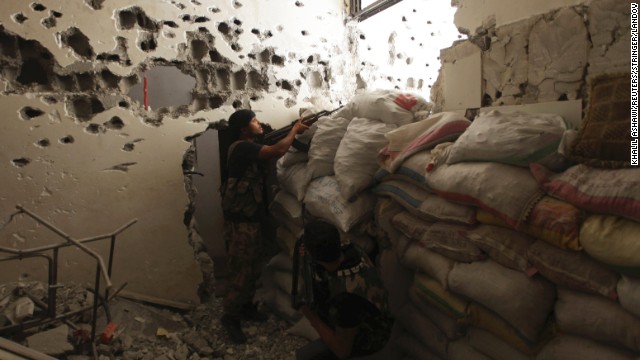 Free Syrian Army fighters take their positions behind piled sandbags, as one of them points his weapon, in Deir ez-Zor on September 2.
Free Syrian Army fighters take their positions behind piled sandbags, as one of them points his weapon, in Deir ez-Zor on September 2. 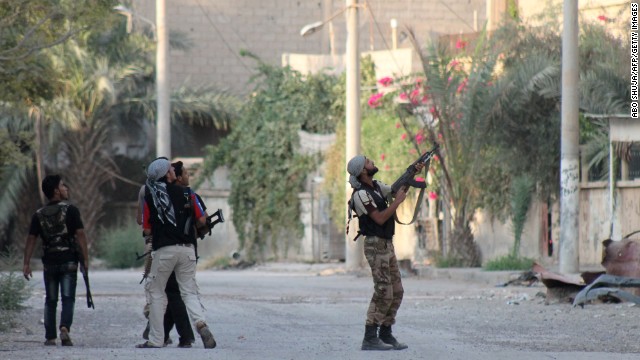 A rebel fighter points his weapon at Syrian regime forces in Deir ez-Zor on September 2.
A rebel fighter points his weapon at Syrian regime forces in Deir ez-Zor on September 2. 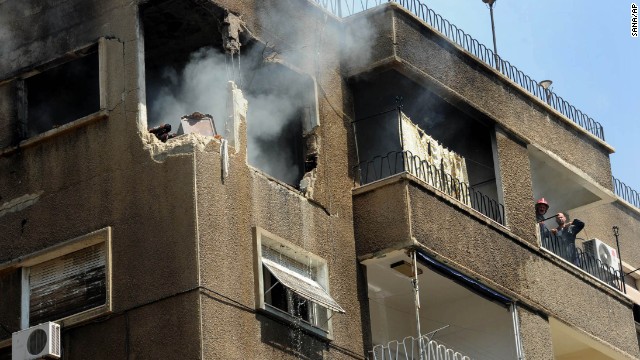 Syrian firefighters try to extinguish a fire after a missile hit a residential building in Damascus, Syria, on September 2.
Syrian firefighters try to extinguish a fire after a missile hit a residential building in Damascus, Syria, on September 2. 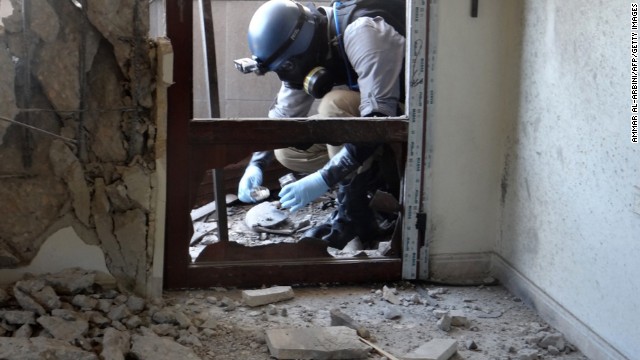 A U.N. arms expert collects samples during an inspection of a suspected chemical weapons strike site in the Ghouta area outside Damascus on August 29.
A U.N. arms expert collects samples during an inspection of a suspected chemical weapons strike site in the Ghouta area outside Damascus on August 29. 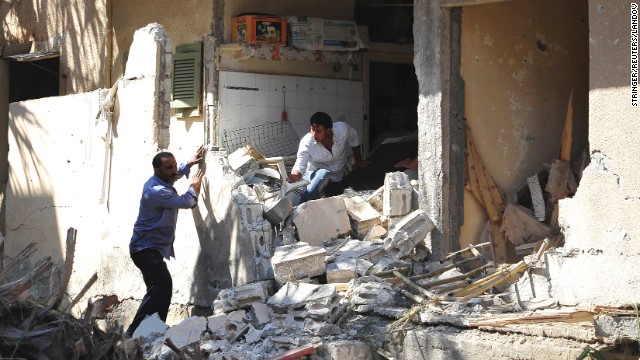 People search for belongings in rubble in Raqqa, Syria, on August 29.
People search for belongings in rubble in Raqqa, Syria, on August 29. 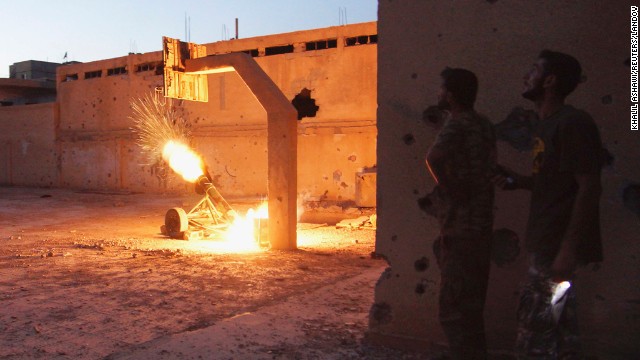 Free Syrian Army fighters launch a rocket toward forces loyal to Syrian President Bashar al-Assad in Deir Ezzor on August 29.
Free Syrian Army fighters launch a rocket toward forces loyal to Syrian President Bashar al-Assad in Deir Ezzor on August 29. 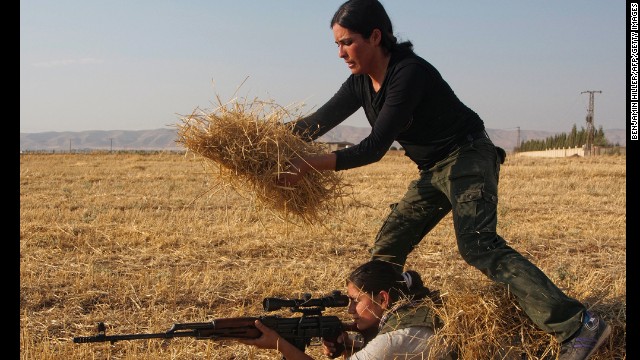 A Syrian Kurd uses hay to hide another woman in a training session organized by the Kurdish Women's Defense Units on Wednesday, August 28, in a northern Syrian border village. They're preparing if the area comes under attack.
A Syrian Kurd uses hay to hide another woman in a training session organized by the Kurdish Women's Defense Units on Wednesday, August 28, in a northern Syrian border village. They're preparing if the area comes under attack. 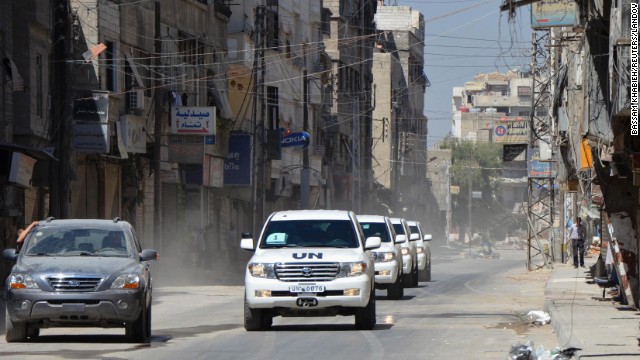 Free Syrian Army fighters escort U.N. vehicles with chemical weapons experts on August 28 through a site of a suspected chemical weapons attack outside Damascus.
Free Syrian Army fighters escort U.N. vehicles with chemical weapons experts on August 28 through a site of a suspected chemical weapons attack outside Damascus. 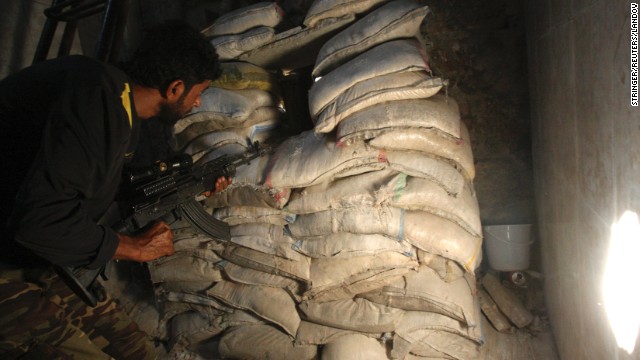 A Free Syrian Army fighter takes position behind sandbags in the old city of Aleppo, Syria, on Tuesday, August 27.
A Free Syrian Army fighter takes position behind sandbags in the old city of Aleppo, Syria, on Tuesday, August 27. 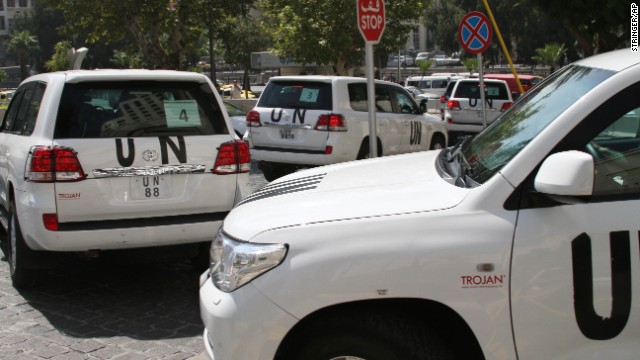 A U.N. team leaves its Damascus, Syria, hotel in a convoy on Monday, August 26. The team was to investigate an alleged chemical attack that killed hundreds last week in a suburb of the Syrian capital. Sniper fire hit a vehicle used by the U.N. chemical weapons investigation team multiple times Monday, according to the United Nations.
A U.N. team leaves its Damascus, Syria, hotel in a convoy on Monday, August 26. The team was to investigate an alleged chemical attack that killed hundreds last week in a suburb of the Syrian capital. Sniper fire hit a vehicle used by the U.N. chemical weapons investigation team multiple times Monday, according to the United Nations. 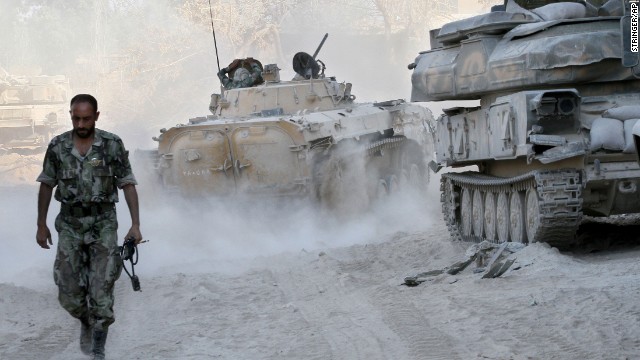 A Syrian soldier walks down a street in Damascus on Saturday, August 24.
A Syrian soldier walks down a street in Damascus on Saturday, August 24. 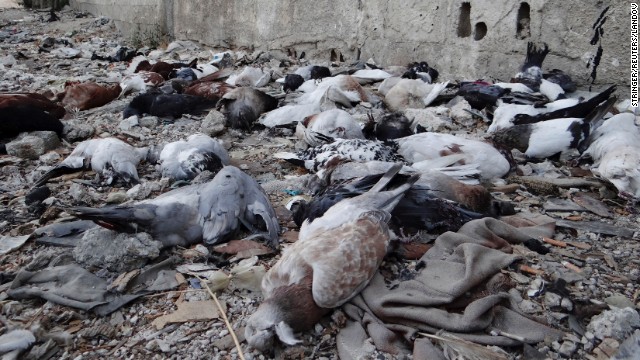 Pigeons lie dead on the ground on August 24 from after what activists say is the use of chemical weapons by government forces in the Damascus suburb of Arbeen.
Pigeons lie dead on the ground on August 24 from after what activists say is the use of chemical weapons by government forces in the Damascus suburb of Arbeen. 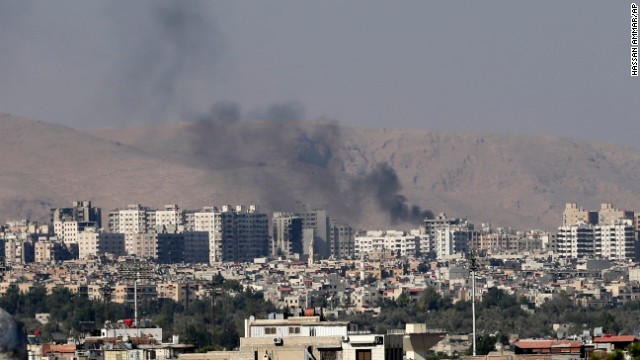 Columns of smoke rise in Barzeh after heavy shelling on Friday, August 23.
Columns of smoke rise in Barzeh after heavy shelling on Friday, August 23. 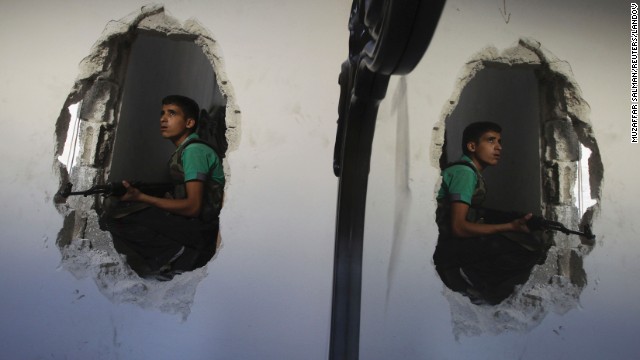 A young Free Syrian Army fighter is reflected in a mirror as he takes position in a house in Aleppo on Thursday, August 22.
A young Free Syrian Army fighter is reflected in a mirror as he takes position in a house in Aleppo on Thursday, August 22. 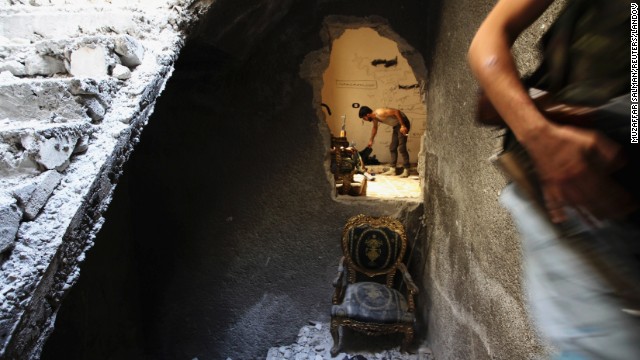 Rebels move around a building in Aleppo on August 22.
Rebels move around a building in Aleppo on August 22. 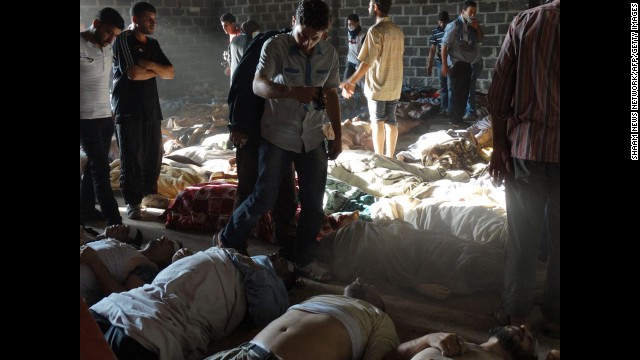 Syrian rebels claim pro-government forces used chemical weapons to kill citizens outside Damascus on Wednesday, August 21. People inspect bodies in this photo released by the Syrian opposition Shaam News Network.
Syrian rebels claim pro-government forces used chemical weapons to kill citizens outside Damascus on Wednesday, August 21. People inspect bodies in this photo released by the Syrian opposition Shaam News Network. 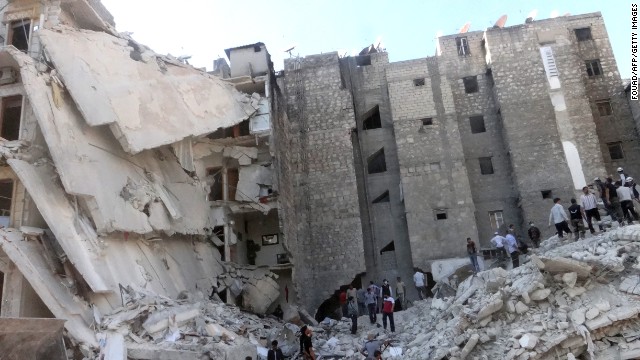 People search the rubble of a bombed building in Aleppo, Syria, on Friday, August 16.
People search the rubble of a bombed building in Aleppo, Syria, on Friday, August 16. 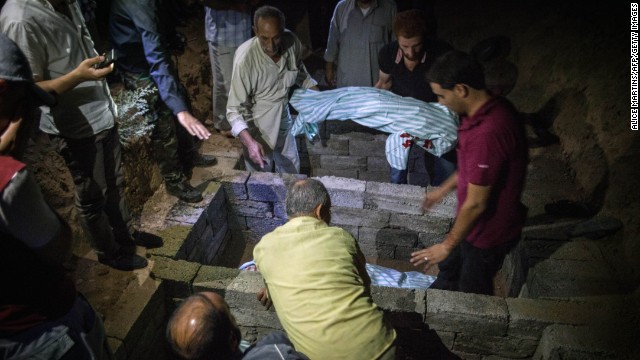 Men bury the bodies of six members of the same family killed in a bombing in Raqqa on Saturday, August 10.
Men bury the bodies of six members of the same family killed in a bombing in Raqqa on Saturday, August 10. 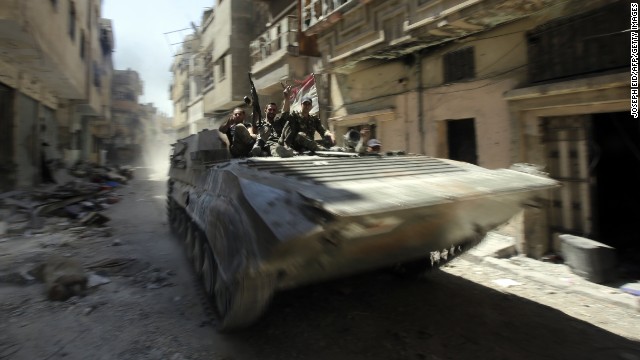 Syrian Army soldiers patrol a devastated street in Homs on Wednesday, July 31.
Syrian Army soldiers patrol a devastated street in Homs on Wednesday, July 31. 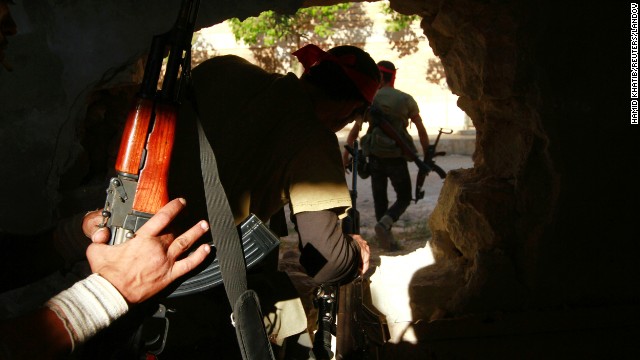 Free Syrian Army fighters move through a hole in a wall in Khan al-Assal on Monday, July 22, after seizing the town.
Free Syrian Army fighters move through a hole in a wall in Khan al-Assal on Monday, July 22, after seizing the town. 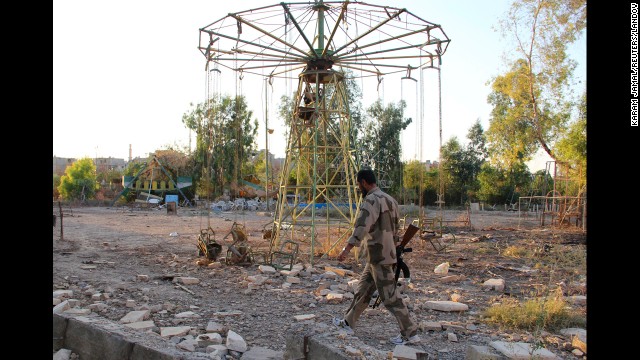 A rebel fighter walks past swings in a deserted playground in Deir al-Zor, Syria, on Sunday, July 21.
A rebel fighter walks past swings in a deserted playground in Deir al-Zor, Syria, on Sunday, July 21. 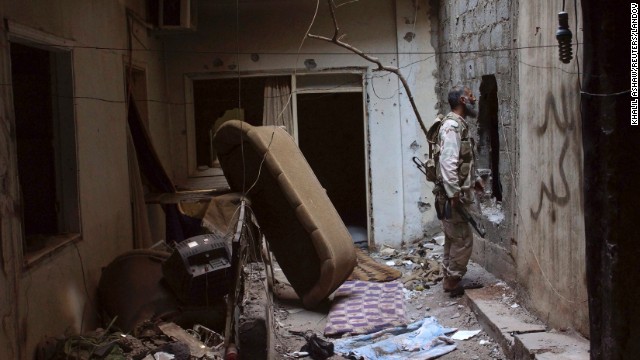 A rebel fighter speaks with a fellow fighter through a hole in a wall in Deir al-Zor on July 21.
A rebel fighter speaks with a fellow fighter through a hole in a wall in Deir al-Zor on July 21. 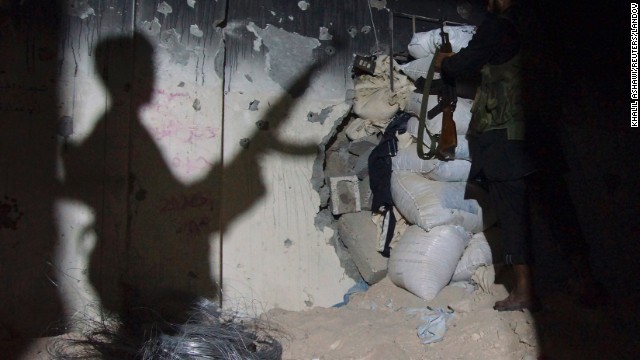 A Free Syrian Army fighter casts a shadow on a wall as he carries his weapon in a shelter in Deir al-Zor on Thursday, July 18.
A Free Syrian Army fighter casts a shadow on a wall as he carries his weapon in a shelter in Deir al-Zor on Thursday, July 18. 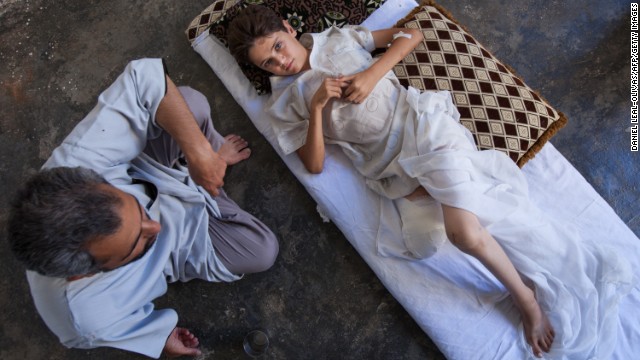 Yahya Sweed, 13, is comforted by his father as he lies on a bed in Kfar Nubul on Tuesday, July 16. The boy was injured by shrapnel, resulting in the amputation of his right leg.
Yahya Sweed, 13, is comforted by his father as he lies on a bed in Kfar Nubul on Tuesday, July 16. The boy was injured by shrapnel, resulting in the amputation of his right leg. 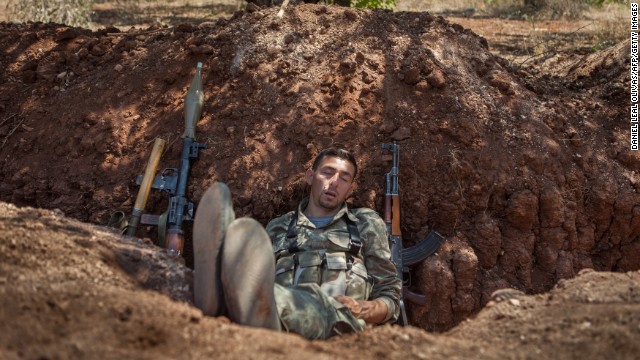 A rebel fighter naps in a trench about 300 feet from the Syrian government forces' positions along the highway connecting Idlib with Latakia on Monday, July 15.
A rebel fighter naps in a trench about 300 feet from the Syrian government forces' positions along the highway connecting Idlib with Latakia on Monday, July 15. 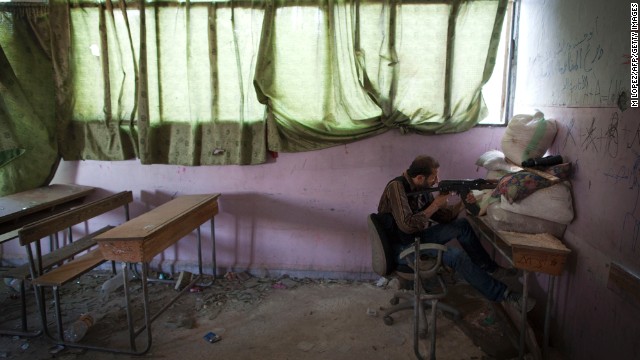 A rebel fighter uses a hole in the wall of a destroyed school to aim at Syrian government forces in the Izaa district of Aleppo on Sunday, July 14.
A rebel fighter uses a hole in the wall of a destroyed school to aim at Syrian government forces in the Izaa district of Aleppo on Sunday, July 14. 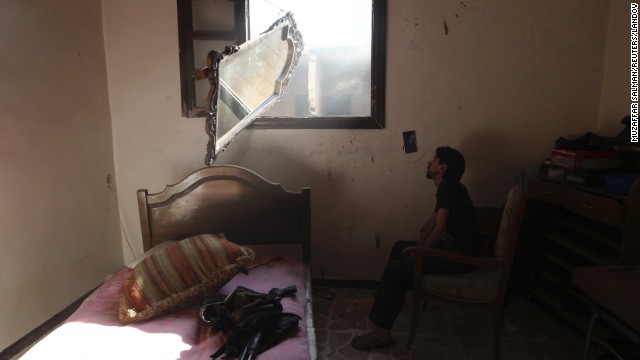 A Free Syrian Army fighter uses a mirror to scope out snipers loyal to Syrian President Bashar al-Assad in Aleppo on Friday, July 12.
A Free Syrian Army fighter uses a mirror to scope out snipers loyal to Syrian President Bashar al-Assad in Aleppo on Friday, July 12. 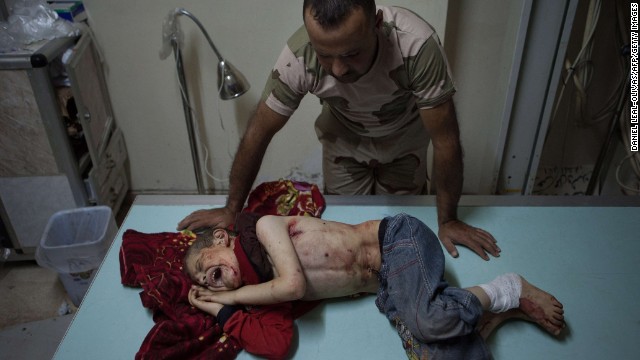 A Free Syrian Army fighter stands over a boy who was injured during shelling in Al-Bara on Monday, July 8.
A Free Syrian Army fighter stands over a boy who was injured during shelling in Al-Bara on Monday, July 8. 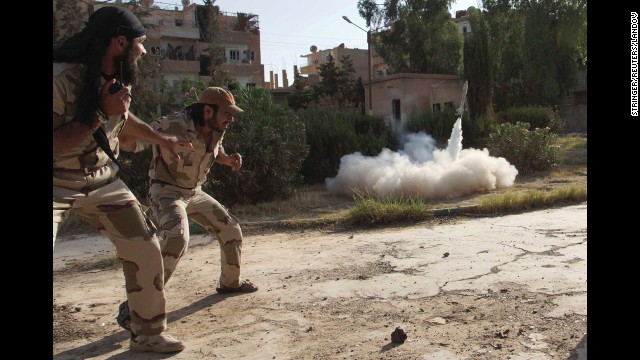 Members of the Free Syrian Army fire a homemade rocket toward regime forces in Deir al-Zor on Sunday, June 16.
Members of the Free Syrian Army fire a homemade rocket toward regime forces in Deir al-Zor on Sunday, June 16. 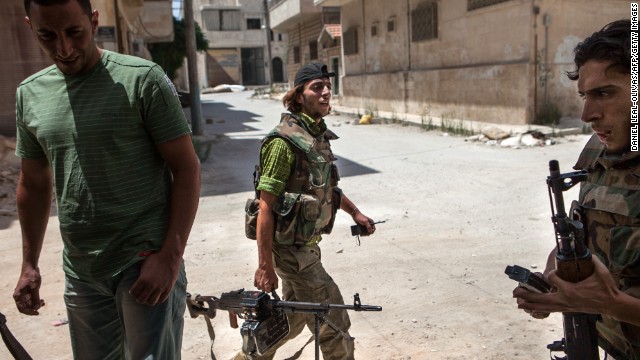 Syrian rebels leave their position in the northwestern town of Maaret al-Numan on Thursday, June 13. The White House said that the Syrian government has crossed a "red line" with its use of chemical weapons and announced it would start arming the rebels.
Syrian rebels leave their position in the northwestern town of Maaret al-Numan on Thursday, June 13. The White House said that the Syrian government has crossed a "red line" with its use of chemical weapons and announced it would start arming the rebels. 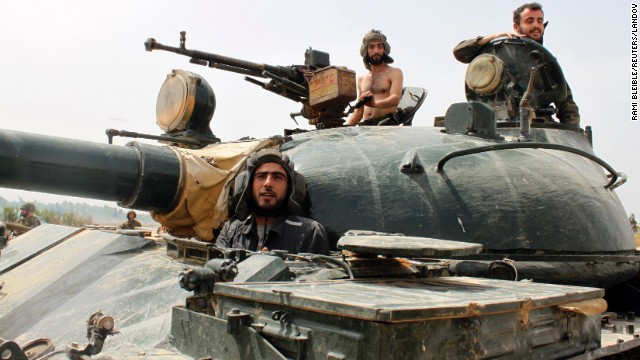 Forces loyal to Syrian President Bashar al-Assad are seen near Qusayr on Thursday, May 30.
Forces loyal to Syrian President Bashar al-Assad are seen near Qusayr on Thursday, May 30. 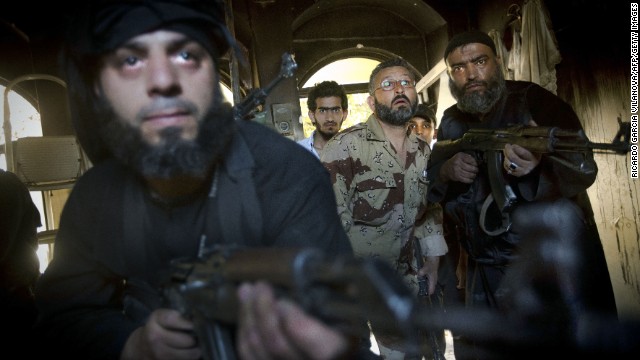 Syrian rebels take position in a house during clashes with regime forces in the old city of Aleppo on May 22.
Syrian rebels take position in a house during clashes with regime forces in the old city of Aleppo on May 22. 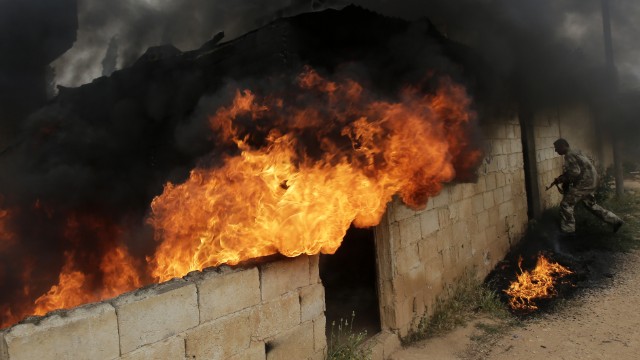 Syrian army soldiers take control of the village of Western Dumayna north of the rebel-held city of Qusayr on Monday, May 13. Syrian troops captured three villages in Homs province, allowing them to cut supply lines to rebels inside Qusayr town, a military officer told AFP.
Syrian army soldiers take control of the village of Western Dumayna north of the rebel-held city of Qusayr on Monday, May 13. Syrian troops captured three villages in Homs province, allowing them to cut supply lines to rebels inside Qusayr town, a military officer told AFP. 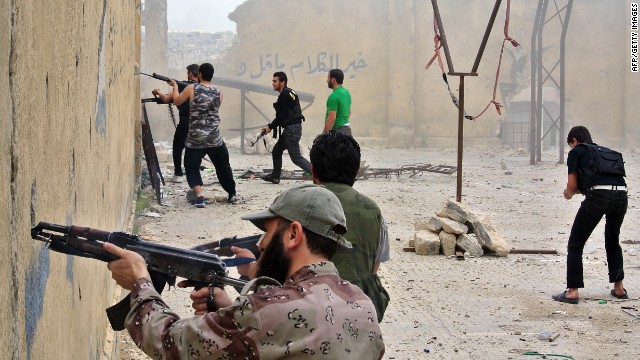 Rebel fighters fire at government forces in the northern Syrian city of Aleppo on Sunday, May 12.
Rebel fighters fire at government forces in the northern Syrian city of Aleppo on Sunday, May 12. 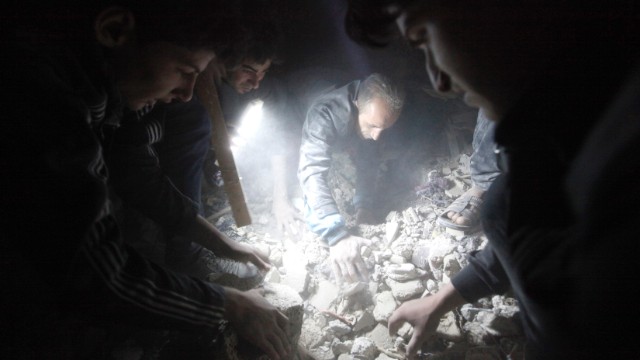 Searchers use a flashlight as they look for survivors among the rubble created by what activists say was a missile attack from the Syrian regime, in Raqqa province, Syria, on April 25.
Searchers use a flashlight as they look for survivors among the rubble created by what activists say was a missile attack from the Syrian regime, in Raqqa province, Syria, on April 25. 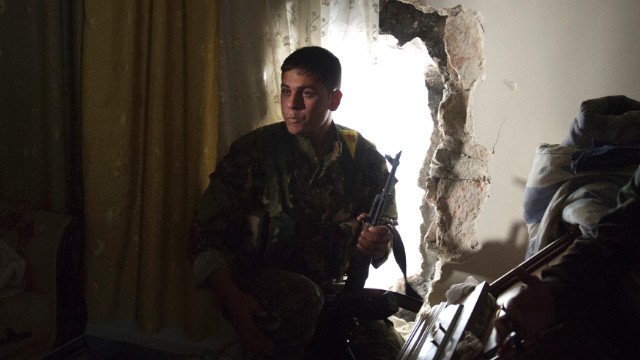 A Kurdish fighter from the "Popular Protection Units" (YPG) takes position inside a building in the majority-Kurdish Sheikh Maqsood area of Aleppo, on Apri. 21.
A Kurdish fighter from the "Popular Protection Units" (YPG) takes position inside a building in the majority-Kurdish Sheikh Maqsood area of Aleppo, on Apri. 21. 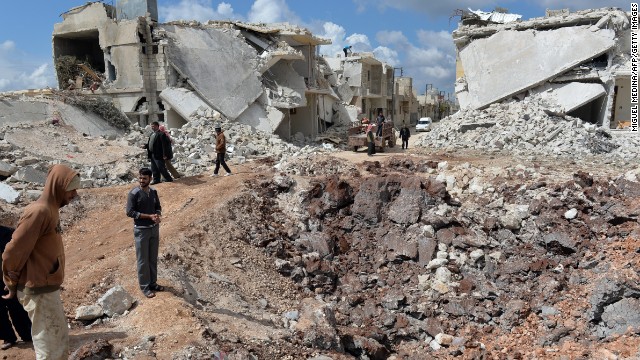 People walk past destroyed houses in the northern Syrian town of Azaz on Sunday, April 21.
People walk past destroyed houses in the northern Syrian town of Azaz on Sunday, April 21. 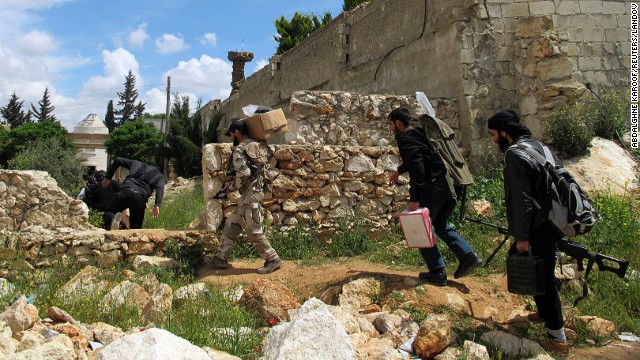 Free Syrian Army fighters take positions prior to an offensive against government forces in the Khan al-Assal area, near Aleppo on Saturday, April 20.
Free Syrian Army fighters take positions prior to an offensive against government forces in the Khan al-Assal area, near Aleppo on Saturday, April 20. 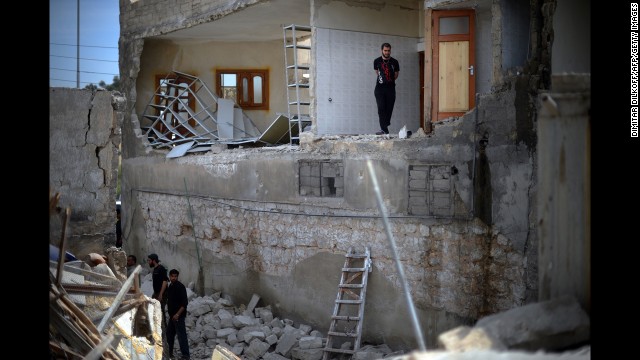 Men inspect damage at a house destroyed in an airstrike in Aleppo on April 15.
Men inspect damage at a house destroyed in an airstrike in Aleppo on April 15. 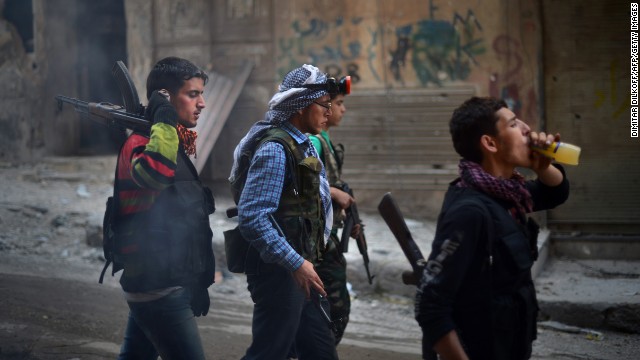 Syrian and Kurdish rebel fighters walk in the Sheikh Maqsud district of Aleppo on April 14.
Syrian and Kurdish rebel fighters walk in the Sheikh Maqsud district of Aleppo on April 14. 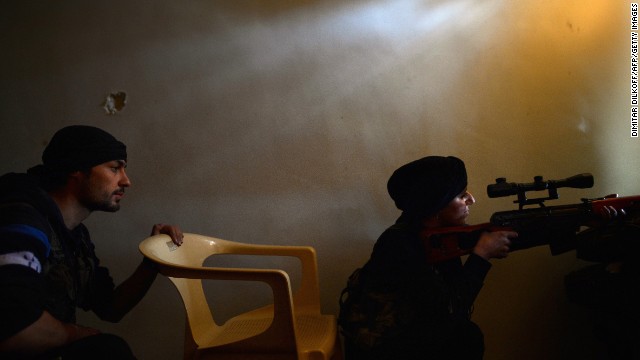 A female rebel monitors the movement of Syrian government forces in Aleppo's Sheikh Maqsud neighborhood on Thursday, April 11.
A female rebel monitors the movement of Syrian government forces in Aleppo's Sheikh Maqsud neighborhood on Thursday, April 11. 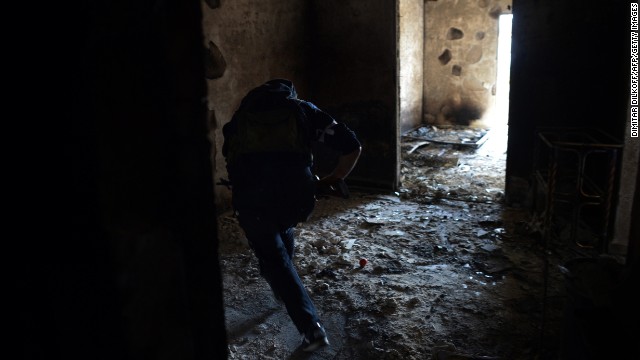 A rebel runs to avoid sniper fire from Syrian government forces in Aleppo on April 11.
A rebel runs to avoid sniper fire from Syrian government forces in Aleppo on April 11. 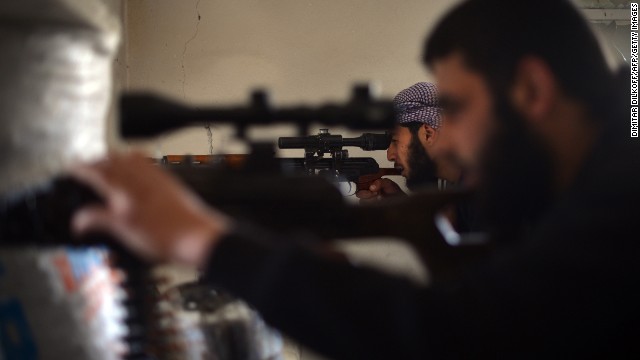 Syrian rebels observe the movement of Syrian government forces around Al-Kendi hospital in Aleppo on Wednesday, April 10.
Syrian rebels observe the movement of Syrian government forces around Al-Kendi hospital in Aleppo on Wednesday, April 10. 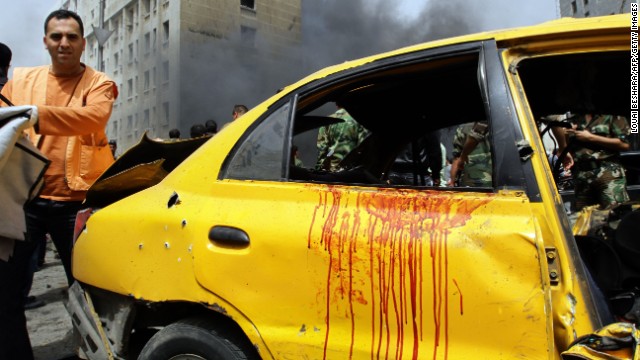 Rescue teams and security forces check out the scene of a deadly car bomb explosion in Damascus on April 8.
Rescue teams and security forces check out the scene of a deadly car bomb explosion in Damascus on April 8. 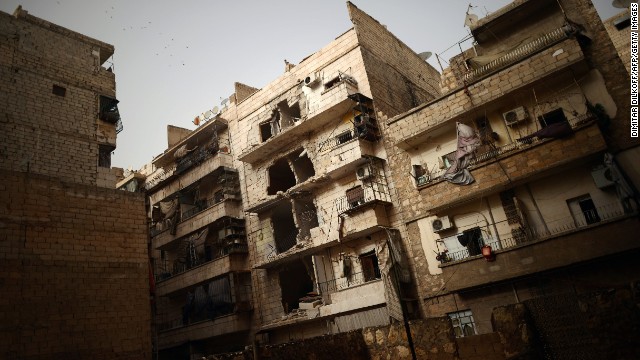 The fighting has taken a toll on buildings in Aleppo's Saladin district, seen here on April 8.
The fighting has taken a toll on buildings in Aleppo's Saladin district, seen here on April 8. 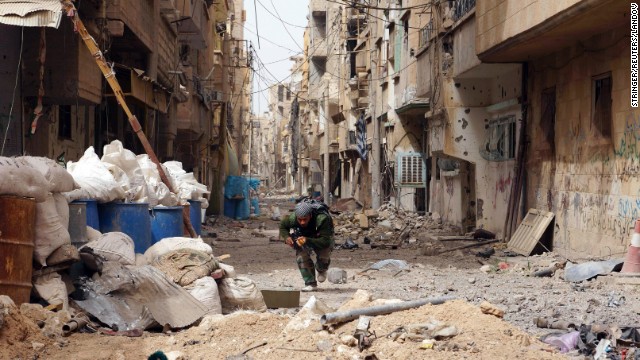 A Syrian rebel runs for cover in Deir ez-Zor on April 2.
A Syrian rebel runs for cover in Deir ez-Zor on April 2. 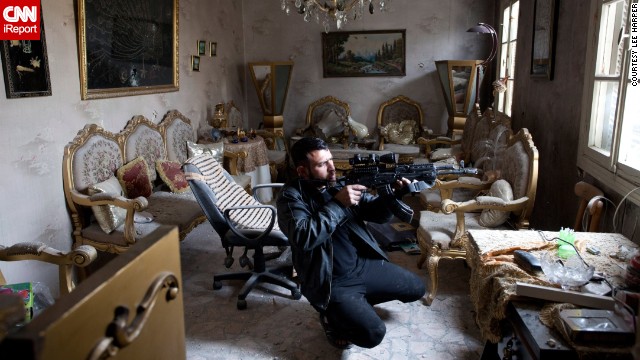 A rebel checks for snipers across the street toward the Citadel in Aleppo, Syria, on Saturday, March 30, in this photo taken by iReporter Lee Harper.
A rebel checks for snipers across the street toward the Citadel in Aleppo, Syria, on Saturday, March 30, in this photo taken by iReporter Lee Harper. 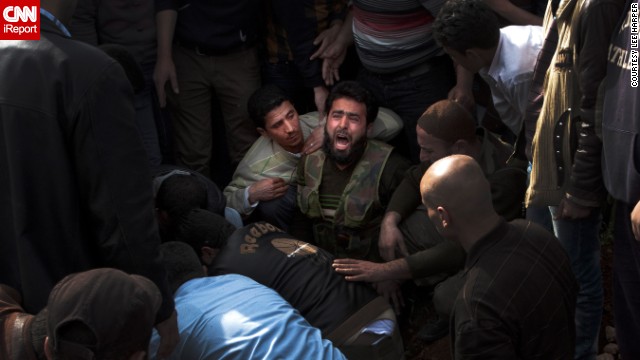 A Free Syrian fighter mourns the death of a friend in Aleppo on March 30, in this photo taken by iReporter Lee Harper.
A Free Syrian fighter mourns the death of a friend in Aleppo on March 30, in this photo taken by iReporter Lee Harper. 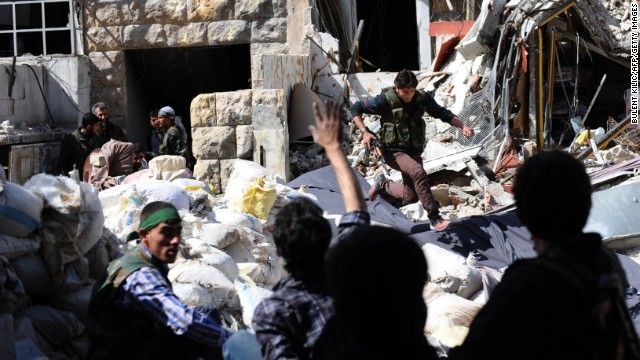 A Syrian opposition fighter runs for cover from Syrian army snipers in Aleppo on Wednesday, March 27.
A Syrian opposition fighter runs for cover from Syrian army snipers in Aleppo on Wednesday, March 27. 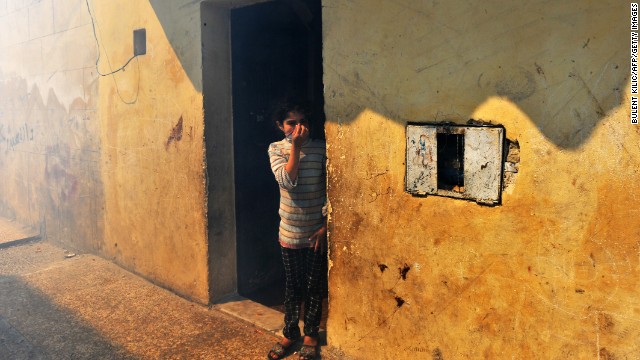 A Syrian girl covers her face to protect herself from fumes as a street covered with uncollected garbage is fumigated in Aleppo on Sunday, March 24.
A Syrian girl covers her face to protect herself from fumes as a street covered with uncollected garbage is fumigated in Aleppo on Sunday, March 24. 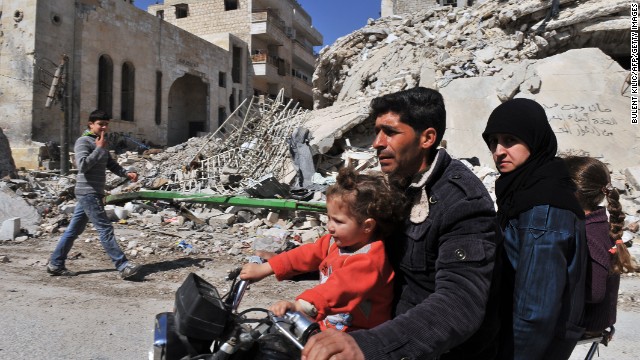 A Syrian man and his family drive past damaged buildings in Maarat al-Numan, on Wednesday, March 20.
A Syrian man and his family drive past damaged buildings in Maarat al-Numan, on Wednesday, March 20. 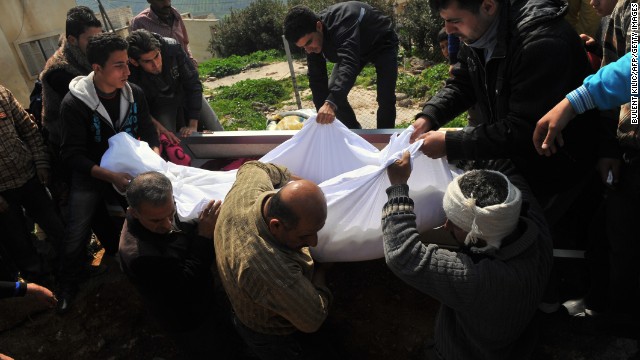 Syrians carry the body of a Syrian army soldier during a funeral ceremony in Idlib province on Tuesday, March 19.
Syrians carry the body of a Syrian army soldier during a funeral ceremony in Idlib province on Tuesday, March 19. 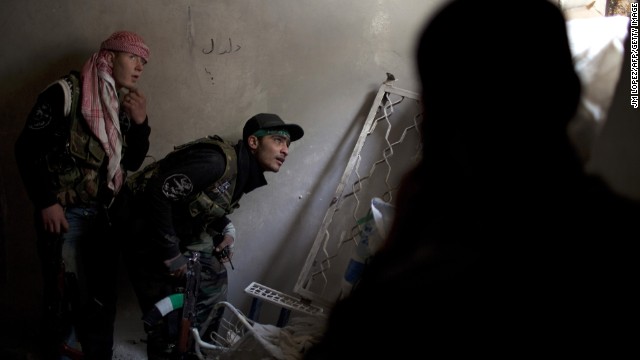 Syrian rebels take position in Aleppo, the largest city in the country, on March 11.
Syrian rebels take position in Aleppo, the largest city in the country, on March 11. 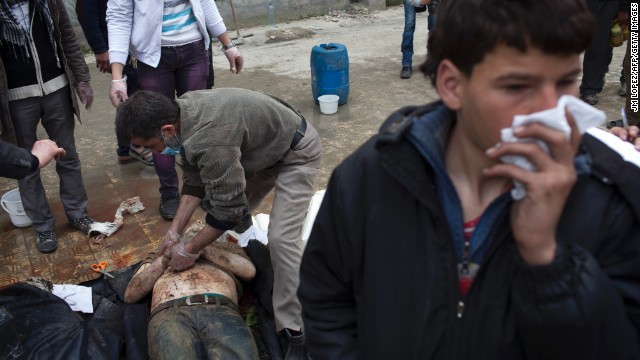 Syrian men search for their relatives amongst the bodies of civilians executed and dumped in the Quweiq River on March 11.
Syrian men search for their relatives amongst the bodies of civilians executed and dumped in the Quweiq River on March 11. 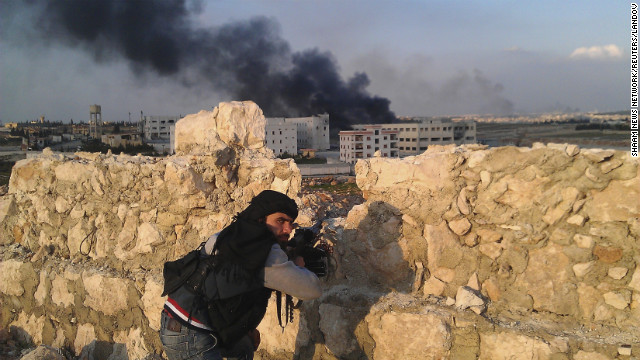 A Free Syrian Army fighter looks back as smoke rises during fighting between rebel fighters and forces loyal to Syria's President Bashar al-Assad on the outskirts of Aleppo on Saturday, March 2.
A Free Syrian Army fighter looks back as smoke rises during fighting between rebel fighters and forces loyal to Syria's President Bashar al-Assad on the outskirts of Aleppo on Saturday, March 2. 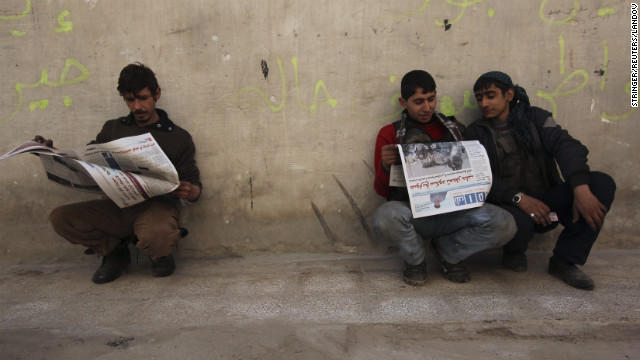 Residents read Shaam News newspapers published by the Free Syrian Army in Aleppo on March 2.
Residents read Shaam News newspapers published by the Free Syrian Army in Aleppo on March 2. 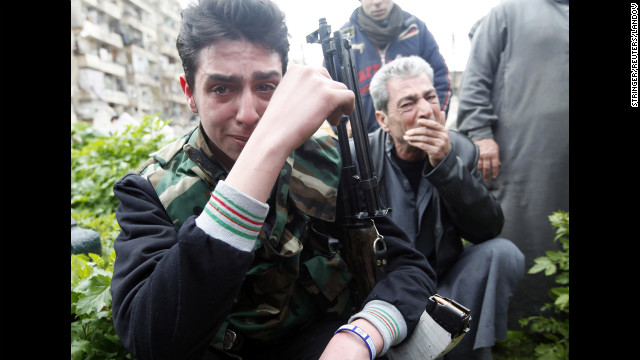 A member of the Free Syrian Army reacts to the death of a comrade who was killed in fighting, at Bustan al Qasr cemetery in Aleppo on Friday, March 1.
A member of the Free Syrian Army reacts to the death of a comrade who was killed in fighting, at Bustan al Qasr cemetery in Aleppo on Friday, March 1. 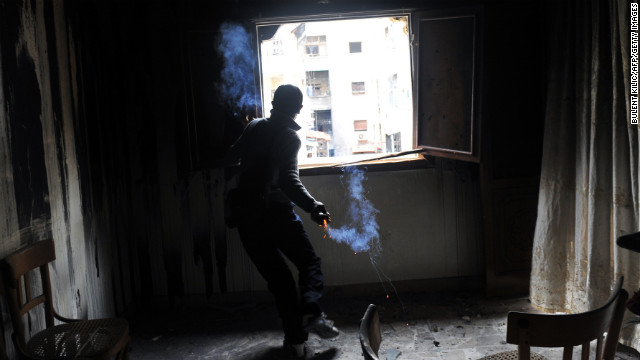 A rebel fighter throws a home-made grenade at Syrian government forces in Aleppo on February 16.
A rebel fighter throws a home-made grenade at Syrian government forces in Aleppo on February 16. 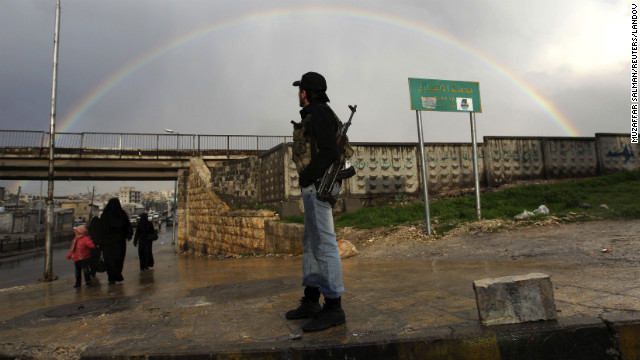 A member of the Free Syrian Army stands with his weapon as he looks at a rainbow in Aleppo on February 16.
A member of the Free Syrian Army stands with his weapon as he looks at a rainbow in Aleppo on February 16. 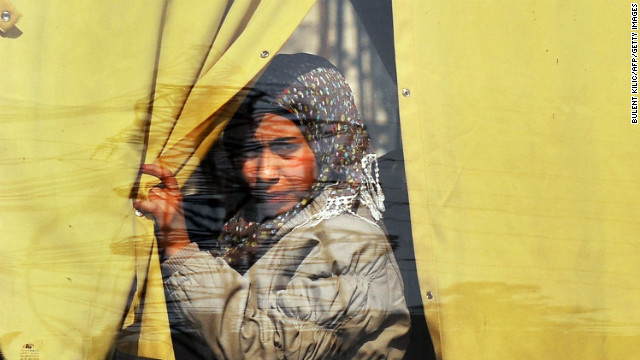 A Syrian woman looks through a bus window in Aleppo on February 14.
A Syrian woman looks through a bus window in Aleppo on February 14. 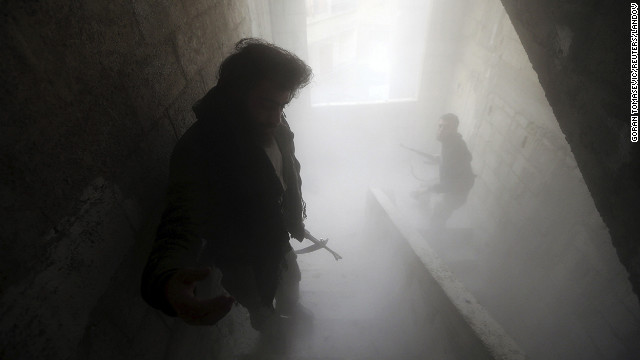 Free Syrian Army fighters walk through a dust-filled stairwell in Damascus on February 7.
Free Syrian Army fighters walk through a dust-filled stairwell in Damascus on February 7. 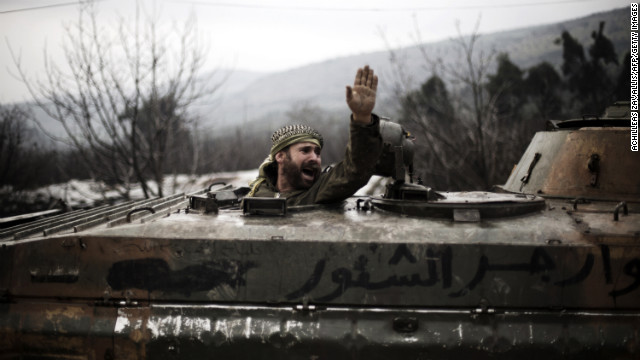 A Syrian rebel gestures at comrades from inside a broken armored personnel carrier in Al-Yaqubia on February 6.
A Syrian rebel gestures at comrades from inside a broken armored personnel carrier in Al-Yaqubia on February 6. 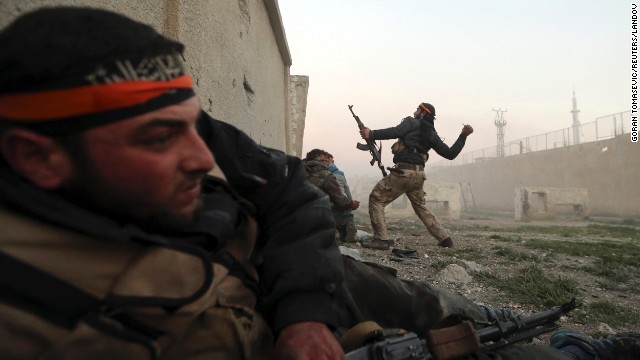 A rebel fighter throws a hand grenade inside a Syrian Army base in Damascus on February 3.
A rebel fighter throws a hand grenade inside a Syrian Army base in Damascus on February 3. 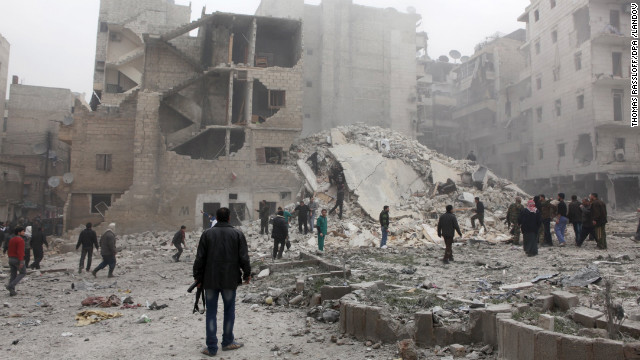 People stand in the dust of a building destroyed in an airstrike in Aleppo, Syria on February 3.
People stand in the dust of a building destroyed in an airstrike in Aleppo, Syria on February 3. 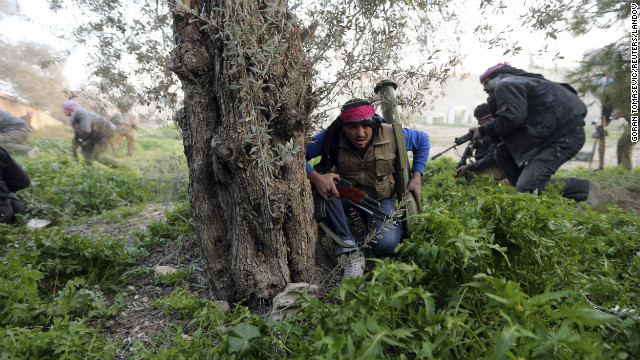 Free Syrian Army fighters run as they enter a Syrian Army base during heavy fighting in the Arabeen neighborhood of Damascus on February 3.
Free Syrian Army fighters run as they enter a Syrian Army base during heavy fighting in the Arabeen neighborhood of Damascus on February 3. 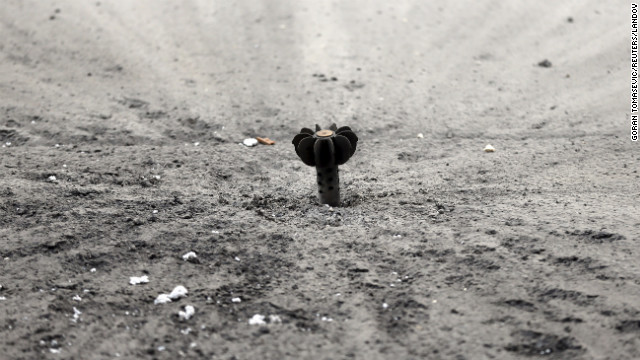 An unexploded mortar shell fired by the Syrian Army sits lodged in the ground in Damascus on January 25.
An unexploded mortar shell fired by the Syrian Army sits lodged in the ground in Damascus on January 25. 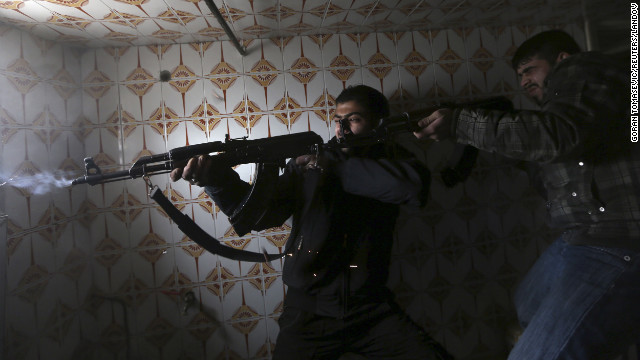 Fighters from Fateh al Sham unit of the Free Syrian Army fire on Syrian Army soldiers at a check point in Damascus on January 20.
Fighters from Fateh al Sham unit of the Free Syrian Army fire on Syrian Army soldiers at a check point in Damascus on January 20. 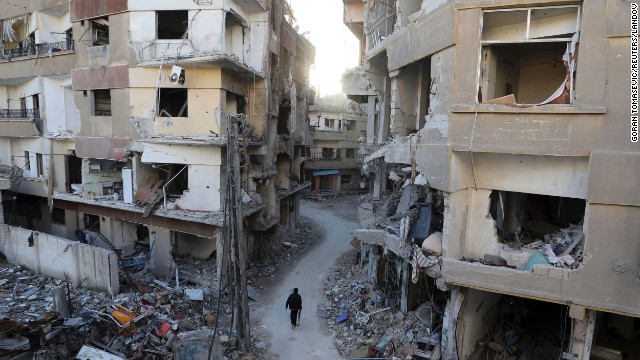 A Free Syrian Army fighter walks between buildings damaged during Syrian Air Force strikes in Damascus on January 19.
A Free Syrian Army fighter walks between buildings damaged during Syrian Air Force strikes in Damascus on January 19. 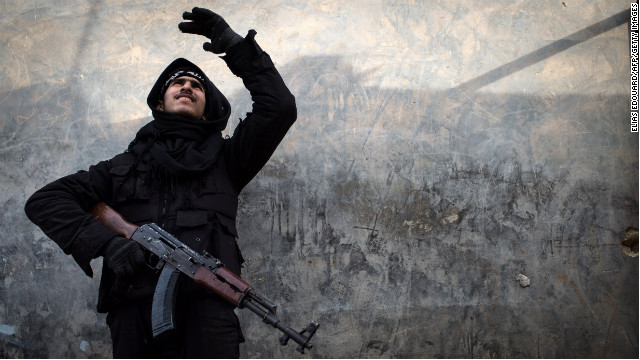 A Syrian rebel fighter tries to locate a government jet fighter in Aleppo on January 18.
A Syrian rebel fighter tries to locate a government jet fighter in Aleppo on January 18. 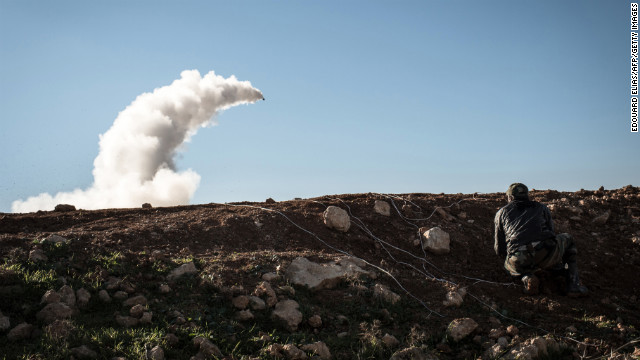 Syrian rebels launch a missile near the Abu Baker brigade in Albab on January 16.
Syrian rebels launch a missile near the Abu Baker brigade in Albab on January 16. 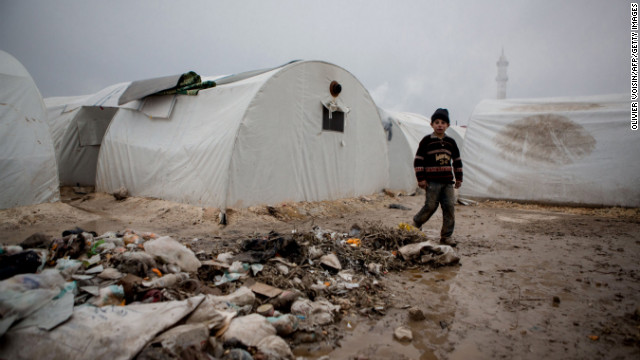 A Syrian boy walks near rubbish next to tents at a refugee camp near the northern city of Azaz on the Syria-Turkey border, on January 8.
A Syrian boy walks near rubbish next to tents at a refugee camp near the northern city of Azaz on the Syria-Turkey border, on January 8. 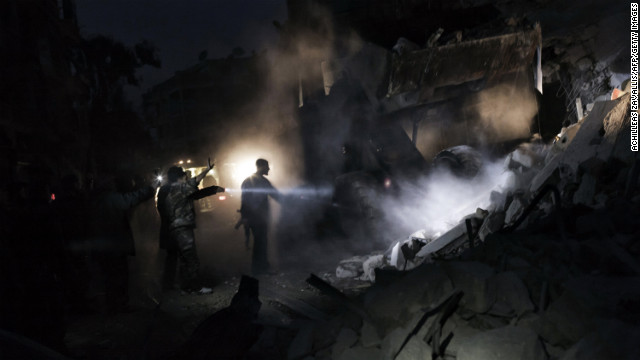 Syrians look for survivors amid the rubble of a building targeted by a missile in Aleppo on January 7.
Syrians look for survivors amid the rubble of a building targeted by a missile in Aleppo on January 7. 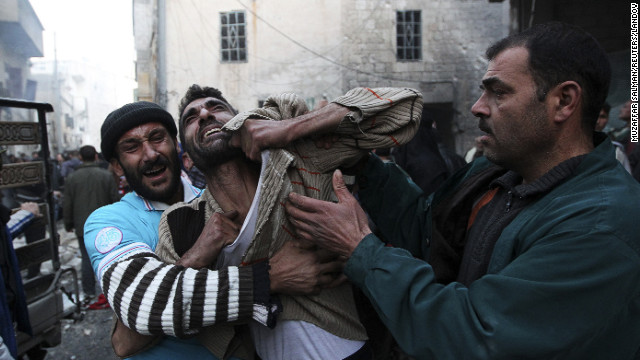 A father reacts after hearing of a shelling by forces loyal to Syria's President Bashar al-Assad in Aleppo on January 3.
A father reacts after hearing of a shelling by forces loyal to Syria's President Bashar al-Assad in Aleppo on January 3. 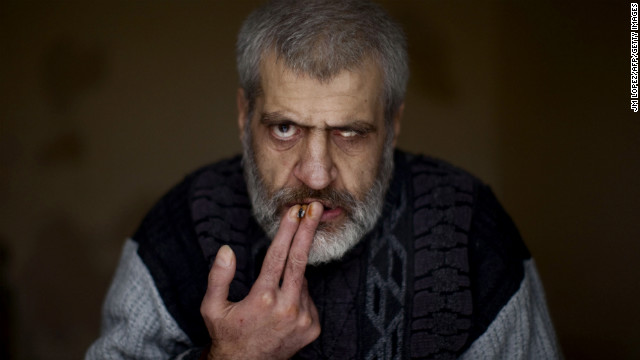 A patient smokes a cigarette at Dar Al-Ajaza psychiatric hospital in Aleppo on December 18, 2012. The psychiatric ward, housing around 60 patients, has lacked the means to function properly since fighting broke out there in July.
A patient smokes a cigarette at Dar Al-Ajaza psychiatric hospital in Aleppo on December 18, 2012. The psychiatric ward, housing around 60 patients, has lacked the means to function properly since fighting broke out there in July. 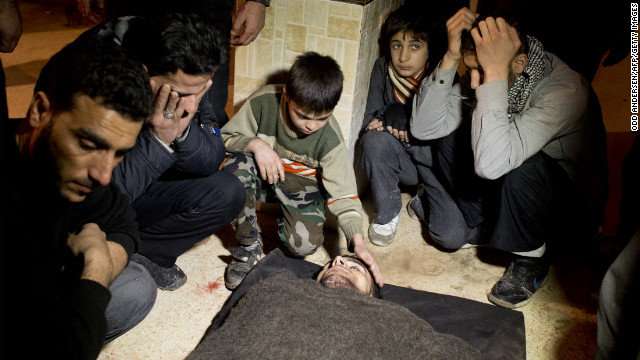 Syrians mourn a fallen rebel fighter at a rebel base in the al-Fardos area of Aleppo on December 8.
Syrians mourn a fallen rebel fighter at a rebel base in the al-Fardos area of Aleppo on December 8. 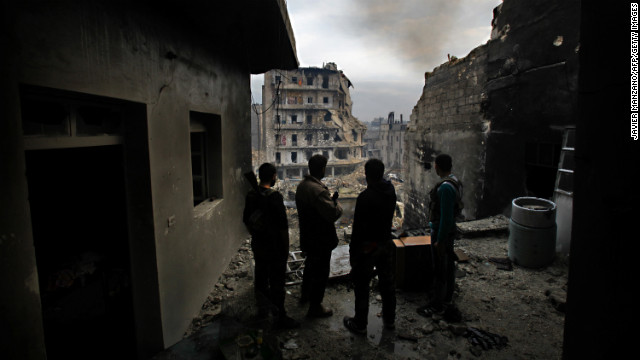 Members of Liwa (Brigade) Salahadin, a Kurdish military unit fighting alongside rebel fighters, monitor the area in the besieged district of Karmel al-Jabl in Aleppo on December 6.
Members of Liwa (Brigade) Salahadin, a Kurdish military unit fighting alongside rebel fighters, monitor the area in the besieged district of Karmel al-Jabl in Aleppo on December 6. 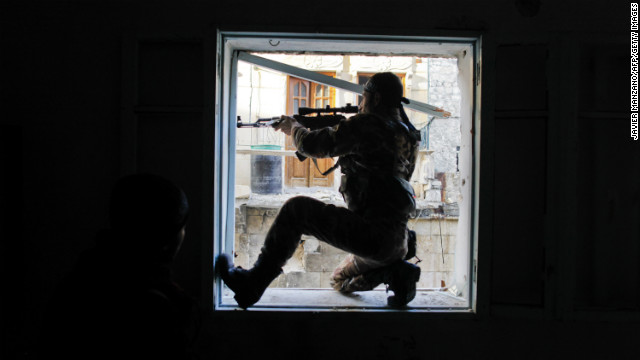 A member of Liwa Salahadin aims at a regime fighter in the besieged district of Karmel al-Jabl in Aleppo on December 6.
A member of Liwa Salahadin aims at a regime fighter in the besieged district of Karmel al-Jabl in Aleppo on December 6. 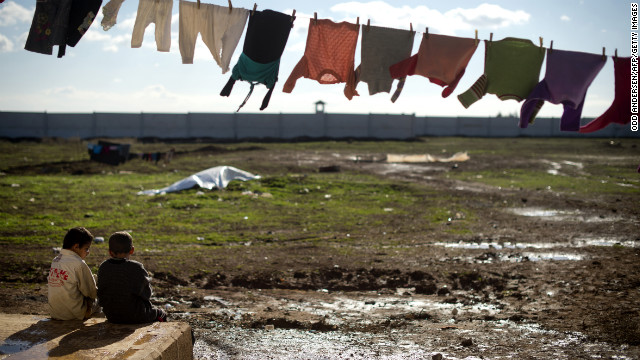 Two young boys sit underneath a washline in a refugee camp on the border between Syria and Turkey near Azaz on December 5.
Two young boys sit underneath a washline in a refugee camp on the border between Syria and Turkey near Azaz on December 5. 
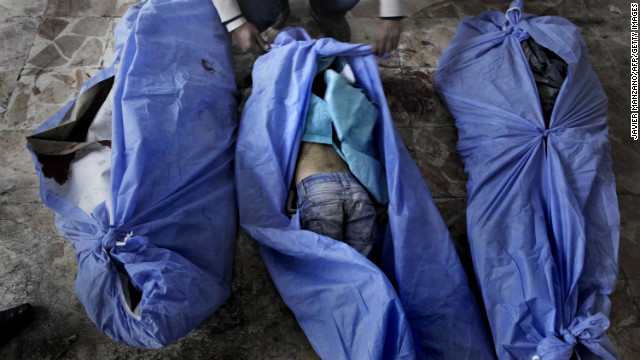 The bodies of three children, who were allegedly killed in a mortar shell attack that landed close to a bakery in Aleppo, on December 2, are laid out for identification by family members at a makeshift hospital at an undisclosed location of the city.
The bodies of three children, who were allegedly killed in a mortar shell attack that landed close to a bakery in Aleppo, on December 2, are laid out for identification by family members at a makeshift hospital at an undisclosed location of the city. 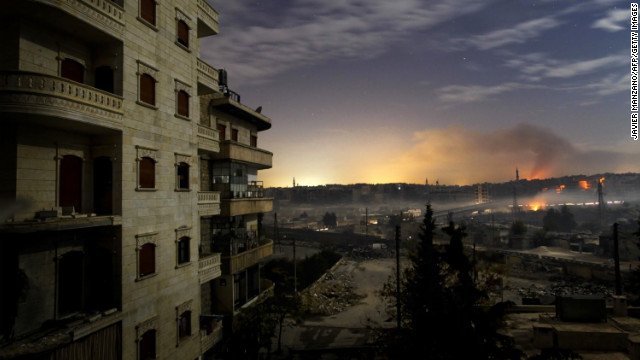 Smoke rises in the Hanano and Bustan al-Basha districts in Aleppo on December 1 as fighting continues through the night.
Smoke rises in the Hanano and Bustan al-Basha districts in Aleppo on December 1 as fighting continues through the night. 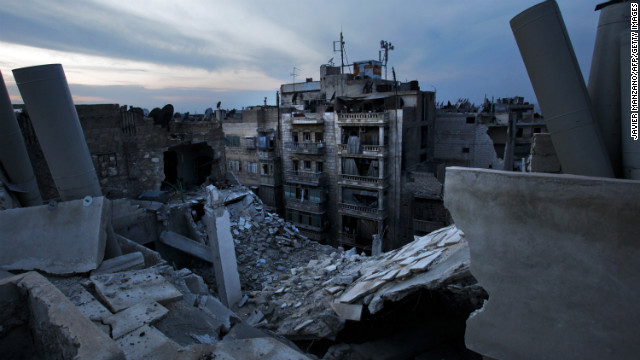 Damaged houses in Aleppo are seen after an airstrike on November 29.
Damaged houses in Aleppo are seen after an airstrike on November 29. 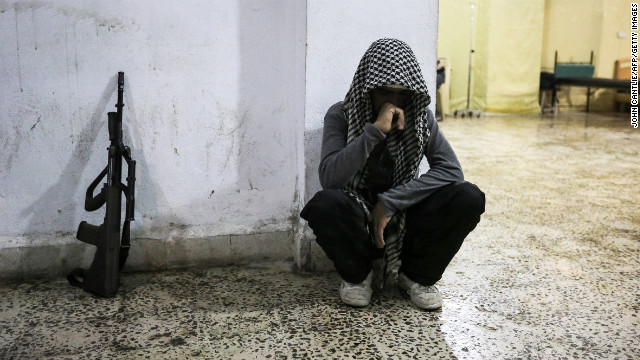 A Syrian rebel mourns the death of a comrade in Maraat al-Numan on November 20.
A Syrian rebel mourns the death of a comrade in Maraat al-Numan on November 20. 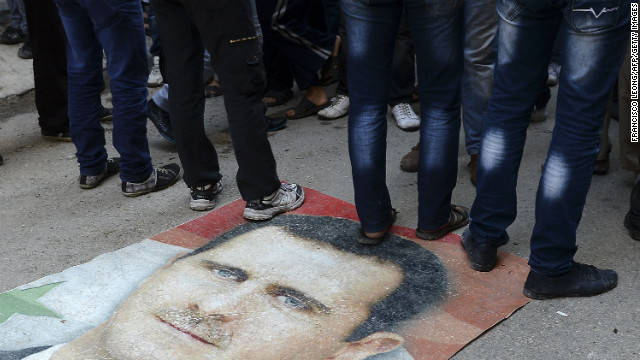 Syrians protesters stand on Assad's portrait during an anti-regime demonstration in Aleppo on November 16.
Syrians protesters stand on Assad's portrait during an anti-regime demonstration in Aleppo on November 16. 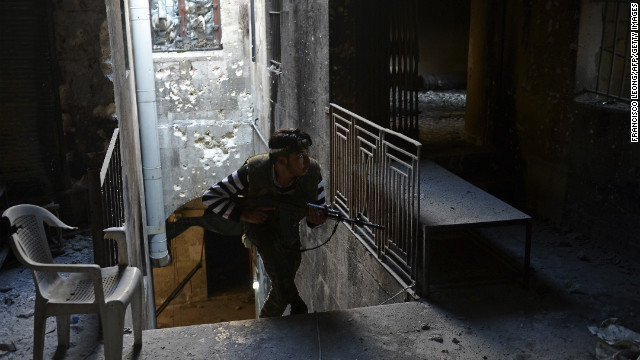 A Syrian rebel takes cover during fighting against Syrian government forces in Aleppo on November 15.
A Syrian rebel takes cover during fighting against Syrian government forces in Aleppo on November 15. 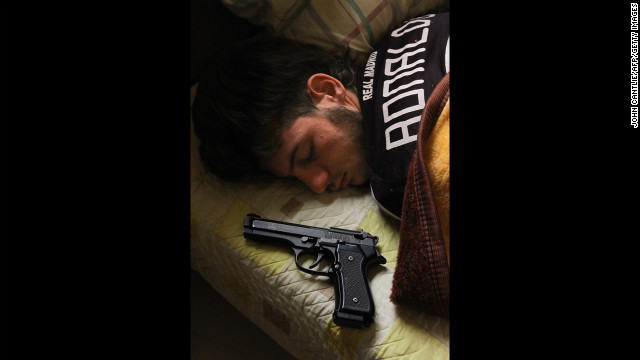 Syrian opposition fighter Bazel Araj, 19, sleeps next to his pistol in Aleppo on November 11.
Syrian opposition fighter Bazel Araj, 19, sleeps next to his pistol in Aleppo on November 11. 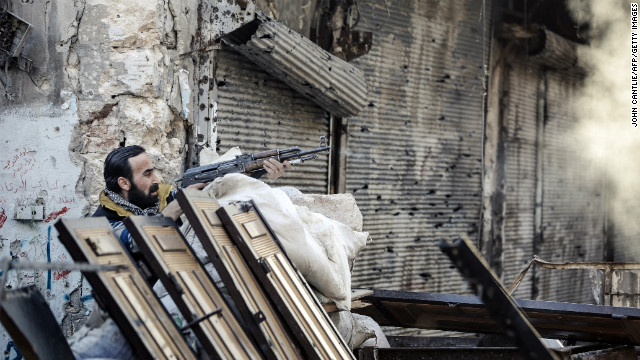 A rebel fighter fires at a Syrian government position in Aleppo on November 6.
A rebel fighter fires at a Syrian government position in Aleppo on November 6. 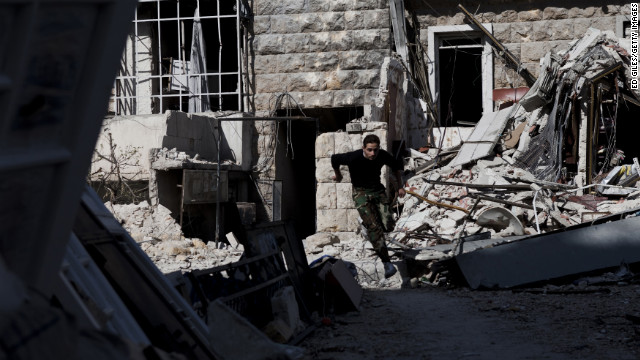 A Syrian rebel leaps over debris left in the street while running across a "sniper alley" near the Salahudeen district in Aleppo on November 4.
A Syrian rebel leaps over debris left in the street while running across a "sniper alley" near the Salahudeen district in Aleppo on November 4. 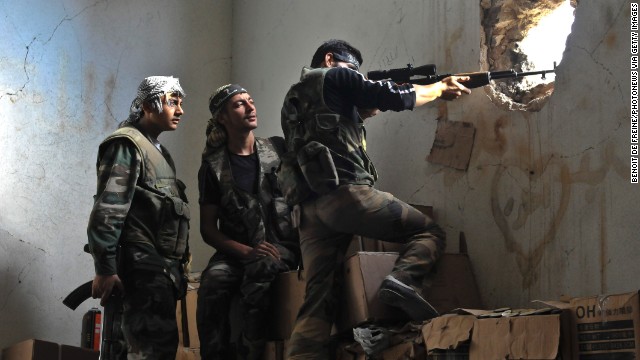 Rebels hold their position in the midst of a battle on November 3 in Aleppo.
Rebels hold their position in the midst of a battle on November 3 in Aleppo. 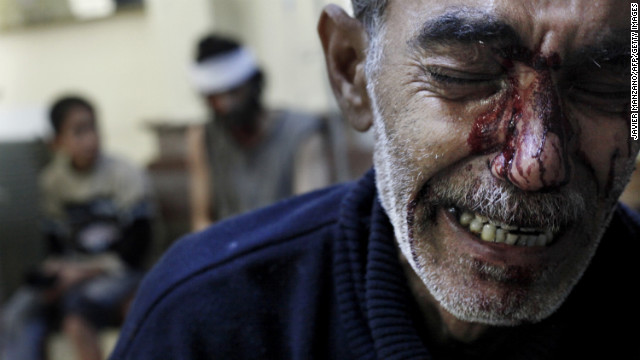 A man cries while being treated in a local hospital in a rebel-controlled area of Aleppo on October 31.
A man cries while being treated in a local hospital in a rebel-controlled area of Aleppo on October 31. 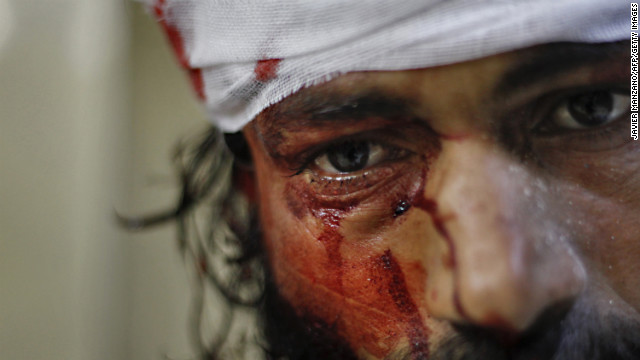 A man is treated for wounds after a government jet attacked the Karm al-Aser neighborhood in eastern Aleppo on October 31.
A man is treated for wounds after a government jet attacked the Karm al-Aser neighborhood in eastern Aleppo on October 31. 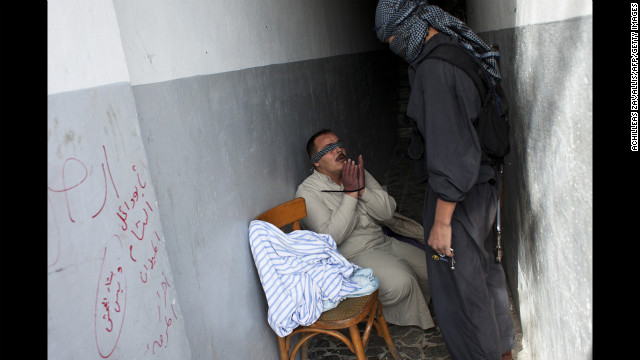 A Syrian rebel interrogates a handcuffed and blindfolded man suspected of being a pro-regime militiaman in Aleppo on October 26.
A Syrian rebel interrogates a handcuffed and blindfolded man suspected of being a pro-regime militiaman in Aleppo on October 26. 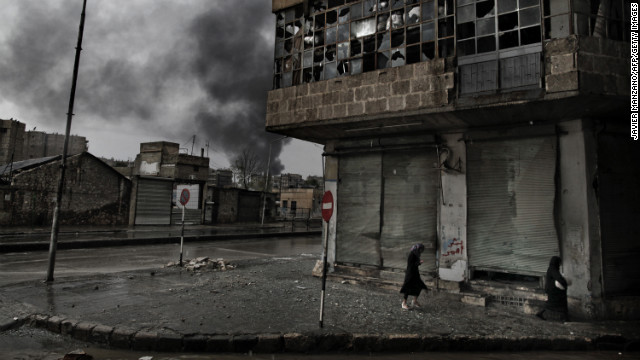 Smoke rises from a fuel station following a mortar attack as Syrian women walk on a rainy day in the Arqub neighborhood of Aleppo on October 25.
Smoke rises from a fuel station following a mortar attack as Syrian women walk on a rainy day in the Arqub neighborhood of Aleppo on October 25. 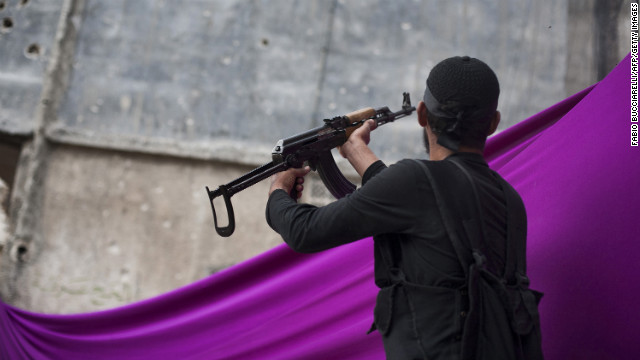 A Syrian rebel fires at an army position in the Karm al-Jabal district of Aleppo on October 22.
A Syrian rebel fires at an army position in the Karm al-Jabal district of Aleppo on October 22. 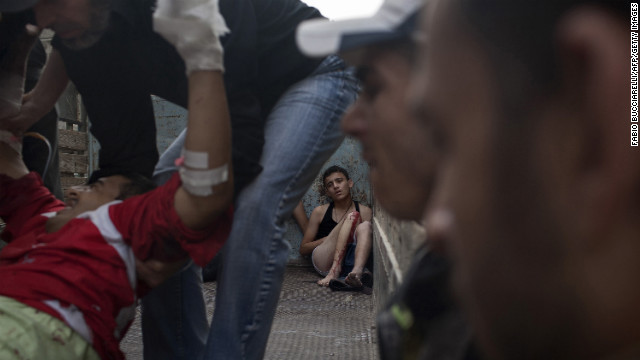 A wounded Syrian boy sits on the back of a truck carrying victims and wounded people to a hospital following an attack by regime forces in Aleppo on October 21.
A wounded Syrian boy sits on the back of a truck carrying victims and wounded people to a hospital following an attack by regime forces in Aleppo on October 21. 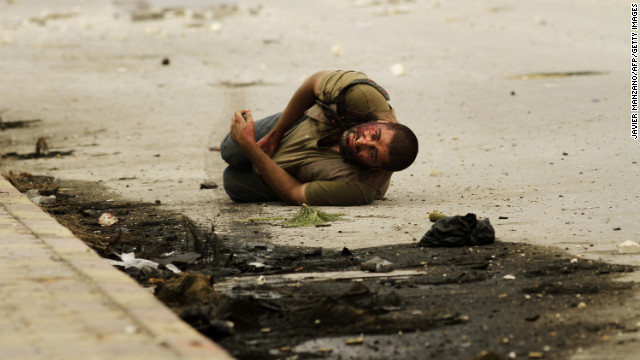 A man lies on the ground after being shot by a sniper for a second time as he waits to be rescued by members of the Al-Baraa Bin Malek Battalion, part of the Free Syria Army's Al-Fatah brigade, in Aleppo on October 20.
A man lies on the ground after being shot by a sniper for a second time as he waits to be rescued by members of the Al-Baraa Bin Malek Battalion, part of the Free Syria Army's Al-Fatah brigade, in Aleppo on October 20. 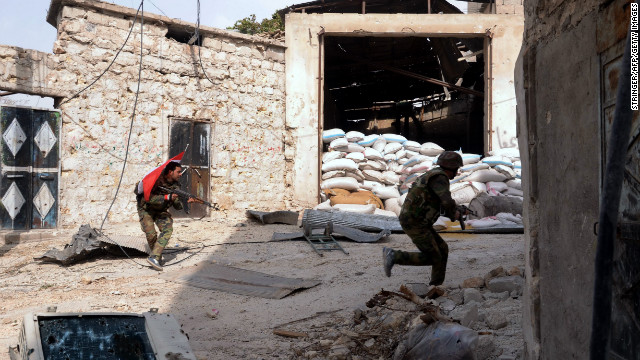 Syrian army soldiers run for cover during clashes with rebel fighters at Karam al-Jabal neighborhood of Aleppo on October 20.
Syrian army soldiers run for cover during clashes with rebel fighters at Karam al-Jabal neighborhood of Aleppo on October 20. 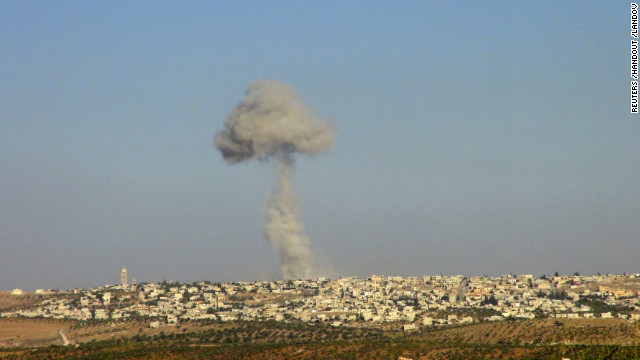 Smoke rises after a Syrian Air Force fighter jet fired missiles at the suburbs of the northern province of Idlib on October 16.
Smoke rises after a Syrian Air Force fighter jet fired missiles at the suburbs of the northern province of Idlib on October 16. 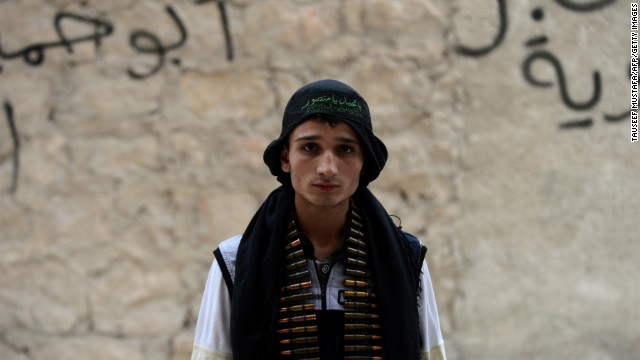 A Syrian opposition fighter stands near a post in Aleppo on October 11.
A Syrian opposition fighter stands near a post in Aleppo on October 11. 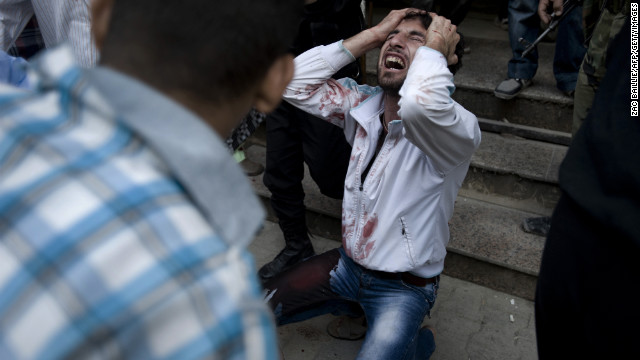 A Syrian man mourns the death of his father, who was killed during a government attack in Aleppo on October 10.
A Syrian man mourns the death of his father, who was killed during a government attack in Aleppo on October 10. 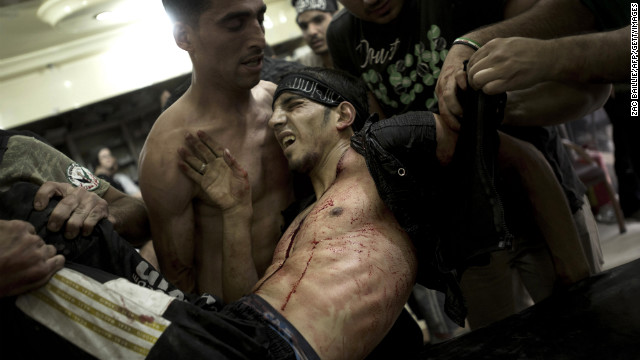 A rebel fighter is carried by his friends and laid on a gurney to be treated for gunshot wounds sustained during heavy battles with government forces in Aleppo on October 1.
A rebel fighter is carried by his friends and laid on a gurney to be treated for gunshot wounds sustained during heavy battles with government forces in Aleppo on October 1. 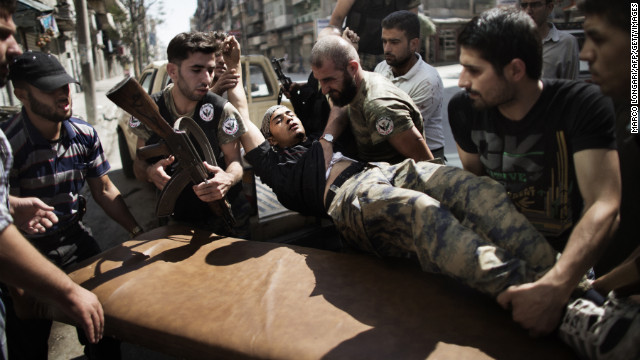 Syrian rebels help a wounded comrade to an Aleppo hospital after he was injured in a Syrian army strike on September 18.
Syrian rebels help a wounded comrade to an Aleppo hospital after he was injured in a Syrian army strike on September 18. 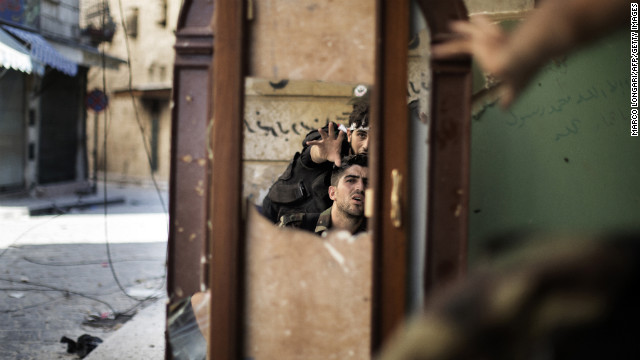 Free Syria Army fighters are reflected in a mirror they use to see a Syrian Army post only 50 meters away in Aleppo on September 16.
Free Syria Army fighters are reflected in a mirror they use to see a Syrian Army post only 50 meters away in Aleppo on September 16. 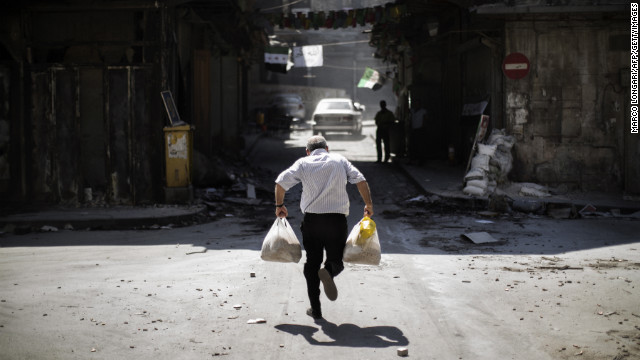 A Syrian man carrying grocery bags tries to dodge sniper fire as he runs through an alley near a checkpoint manned by the Free Syria Army in Aleppo on September 14.
A Syrian man carrying grocery bags tries to dodge sniper fire as he runs through an alley near a checkpoint manned by the Free Syria Army in Aleppo on September 14. 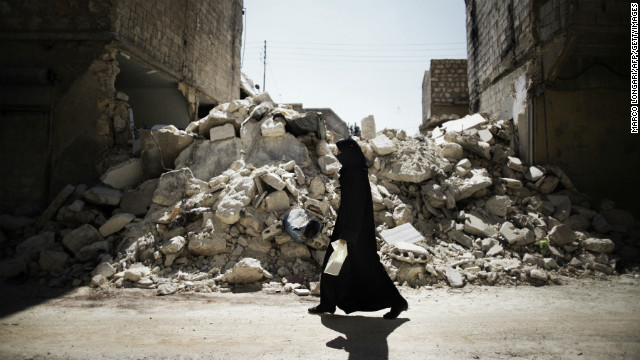 A woman walks past a destroyed building in Aleppo on September 13.
A woman walks past a destroyed building in Aleppo on September 13. 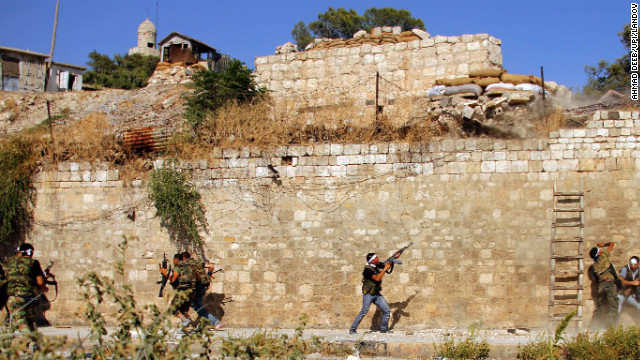 Free Syrian Army fighters battle during street fighting against Syrian army soldiers in Aleppo on September 8.
Free Syrian Army fighters battle during street fighting against Syrian army soldiers in Aleppo on September 8. 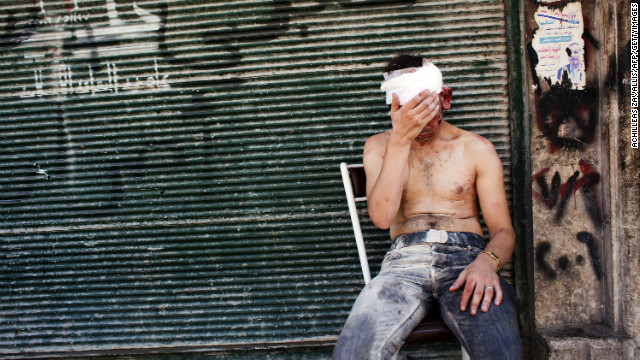 A Syrian man wounded by shelling sits on a chair outside a closed shop in Aleppo on September 4.
A Syrian man wounded by shelling sits on a chair outside a closed shop in Aleppo on September 4. 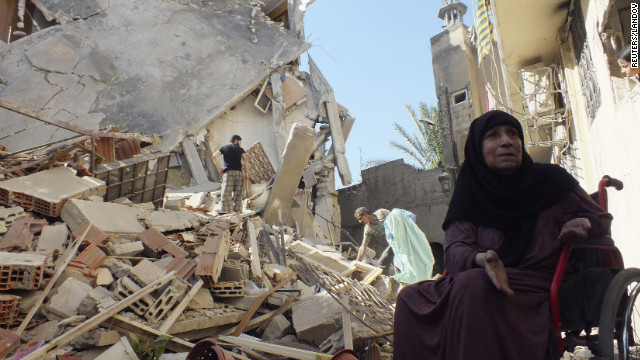 A woman sits in her wheelchair next to her house, damaged by a Syrian air raid, near Homs on August 26.
A woman sits in her wheelchair next to her house, damaged by a Syrian air raid, near Homs on August 26. 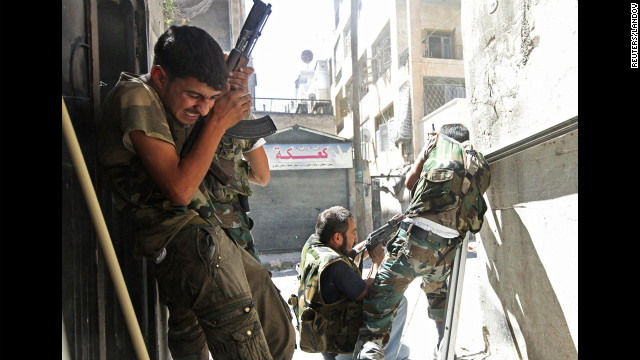 Members of the Free Syrian Army clash with Syrian army soliders in Aleppo's Saif al-Dawla district on August 22.
Members of the Free Syrian Army clash with Syrian army soliders in Aleppo's Saif al-Dawla district on August 22. 
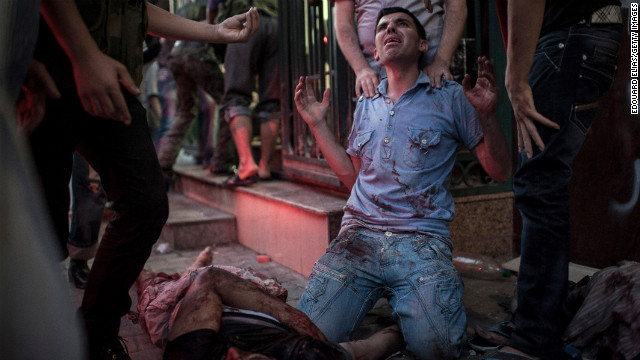 A man mourns in front of a field hospital on August 21 in Aleppo.
A man mourns in front of a field hospital on August 21 in Aleppo. 
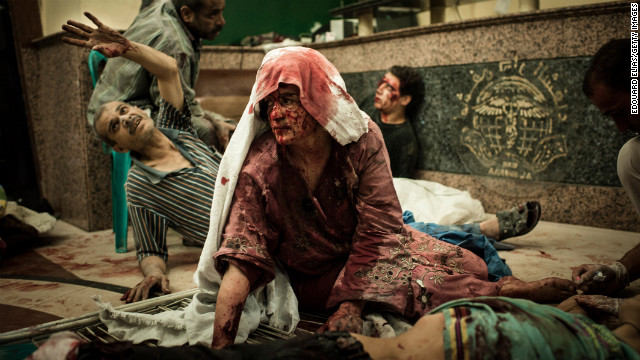 Wounded civilians wait in a field hospital after an air strike on August 21 in Aleppo.
Wounded civilians wait in a field hospital after an air strike on August 21 in Aleppo. 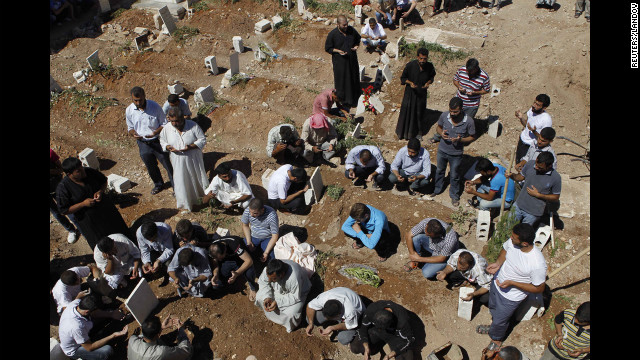 People pray during the funeral of a Free Syrian Army fighter, Amar Ali Amero, on August 21.
People pray during the funeral of a Free Syrian Army fighter, Amar Ali Amero, on August 21. 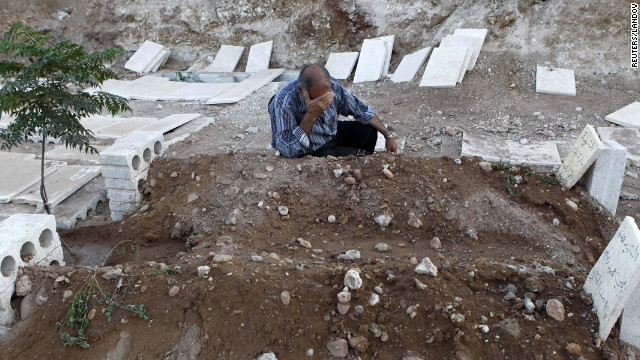 A man cries near the graves of his two children killed during a recent Syrian airstrike in Azaz on August 20.
A man cries near the graves of his two children killed during a recent Syrian airstrike in Azaz on August 20. 
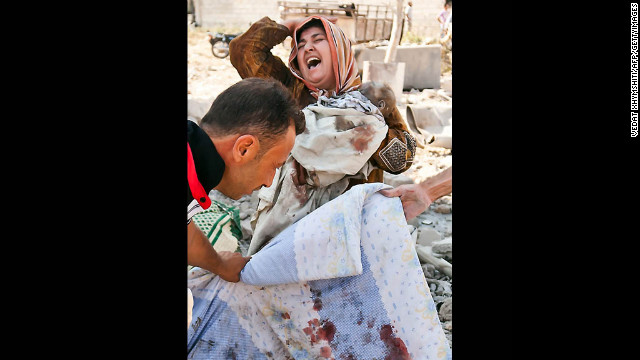 A Syrian woman holds her dead baby as she screams upon seeing her husband's body being covered following an airstrike by regime forces on the town of Azaz on August 15.
A Syrian woman holds her dead baby as she screams upon seeing her husband's body being covered following an airstrike by regime forces on the town of Azaz on August 15. 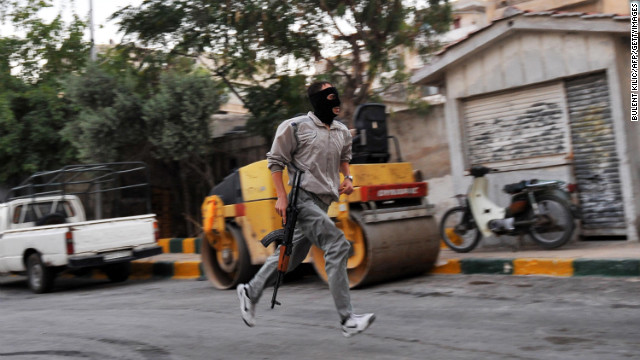 A Syrian rebel runs in a street of Selehattin during an attack on the municipal building on July 23.
A Syrian rebel runs in a street of Selehattin during an attack on the municipal building on July 23. 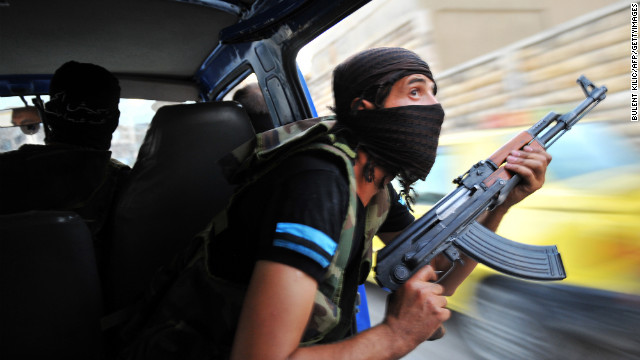 Syrian rebels hunt for snipers after attacking the municipality building in the city center of Selehattin on July 23.
Syrian rebels hunt for snipers after attacking the municipality building in the city center of Selehattin on July 23. 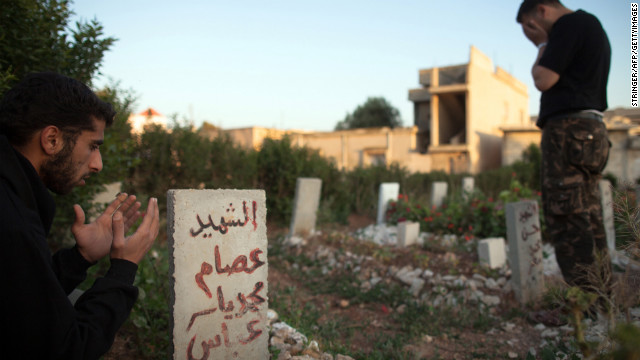 Members of the Free Syrian Army's Mugaweer (commandos) Brigade pay their respects in a cemetery on May 12 in Qusayr.
Members of the Free Syrian Army's Mugaweer (commandos) Brigade pay their respects in a cemetery on May 12 in Qusayr. 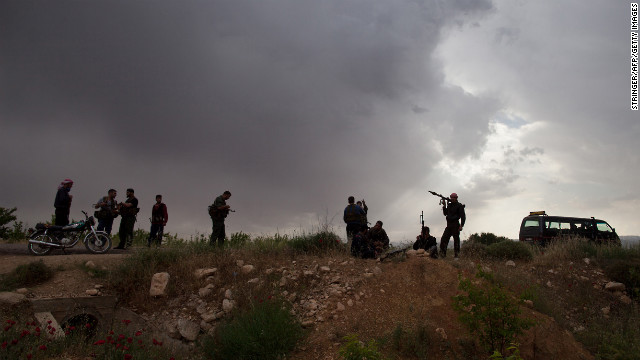 Syrian rebels take position near Qusayr on May 10.
Syrian rebels take position near Qusayr on May 10. 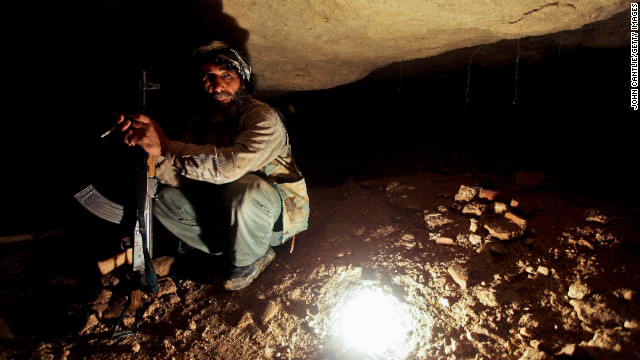 A Free Syrian Army member takes cover in underground caves in Sarmin on April 9.
A Free Syrian Army member takes cover in underground caves in Sarmin on April 9. 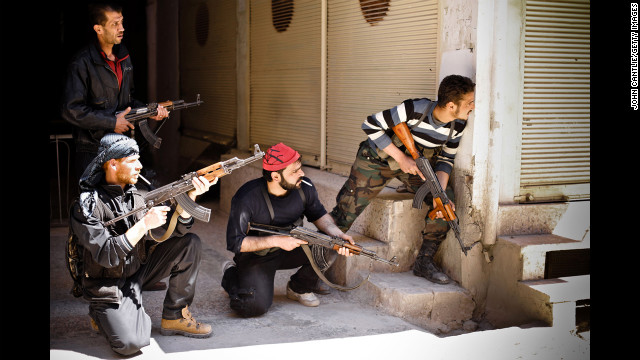 Rebels prepare to engage government tanks that advanced into Saraquib on April 9.
Rebels prepare to engage government tanks that advanced into Saraquib on April 9. 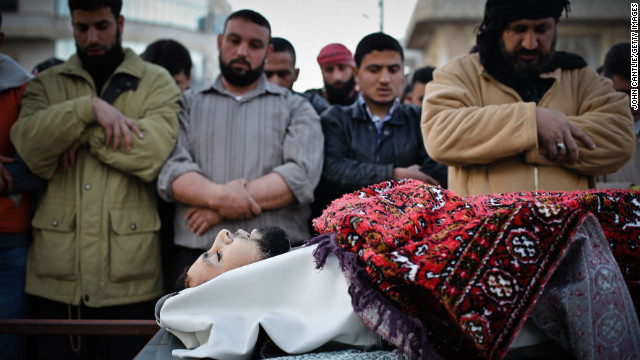 Men say prayers during a ceremony in Binnish on April 9.
Men say prayers during a ceremony in Binnish on April 9. 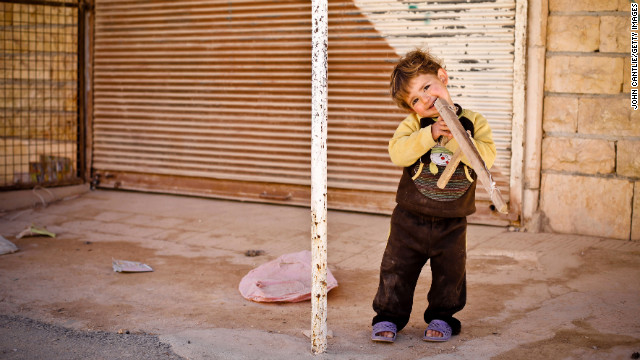 A young boy plays with a toy gun in Binnish on April 9.
A young boy plays with a toy gun in Binnish on April 9. 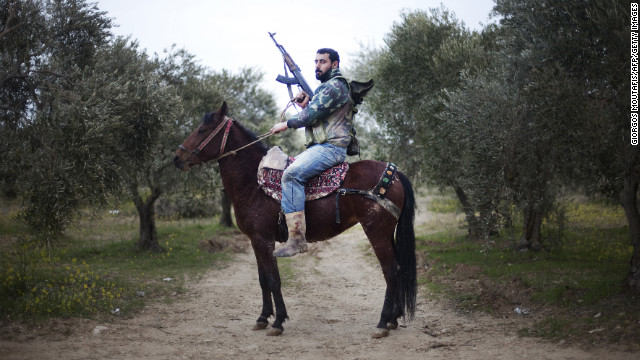 A Free Syrian Army rebel mounts his horse in the Al-Shatouria village near the Turkish border in northwestern Syria on March 16, a year after the uprising began.
A Free Syrian Army rebel mounts his horse in the Al-Shatouria village near the Turkish border in northwestern Syria on March 16, a year after the uprising began. 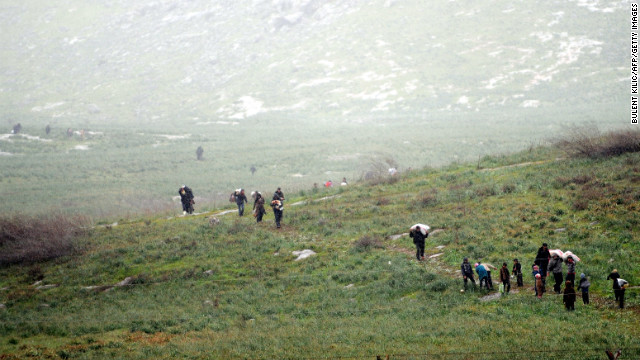 Syrian refugees walk across a field before crossing into Turkey on March 14.
Syrian refugees walk across a field before crossing into Turkey on March 14. 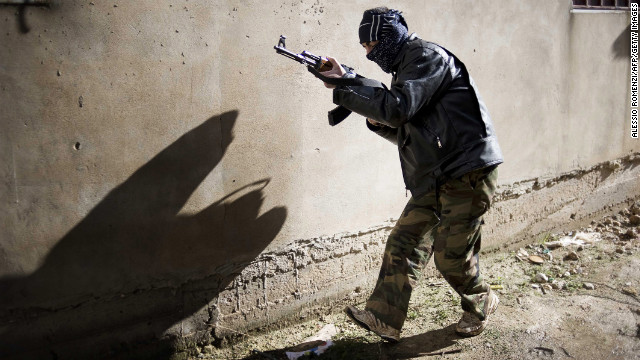 A rebel takes position in Al-Qsair on January 27.
A rebel takes position in Al-Qsair on January 27. 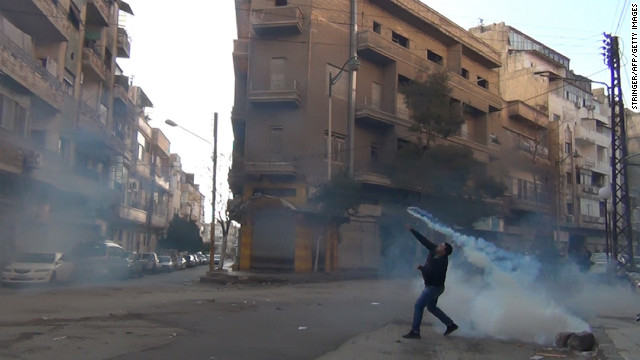 A protester in Homs throws a tear gas bomb back towards security forces, on December 27, 2011.
A protester in Homs throws a tear gas bomb back towards security forces, on December 27, 2011. 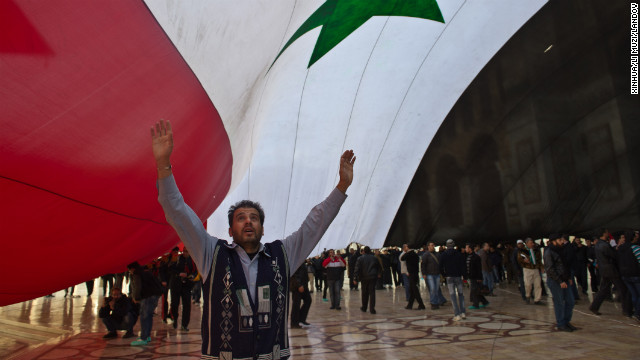 A man stands under a giant Syrian flag outside the Umayyad Mosque in Damascus on December 24, 2011.
A man stands under a giant Syrian flag outside the Umayyad Mosque in Damascus on December 24, 2011. 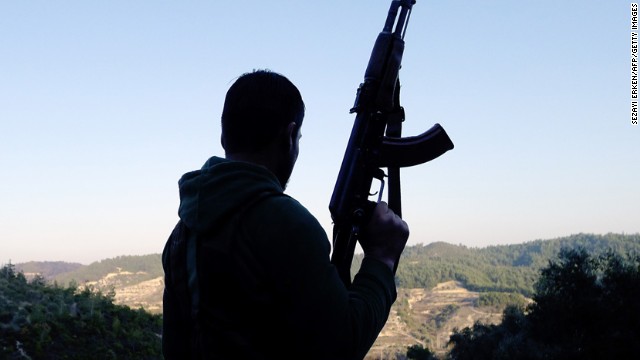 A member of the Free Syrian Army looks out over a valley in the village of Ain al-Baida on December 15, 2011.
A member of the Free Syrian Army looks out over a valley in the village of Ain al-Baida on December 15, 2011. 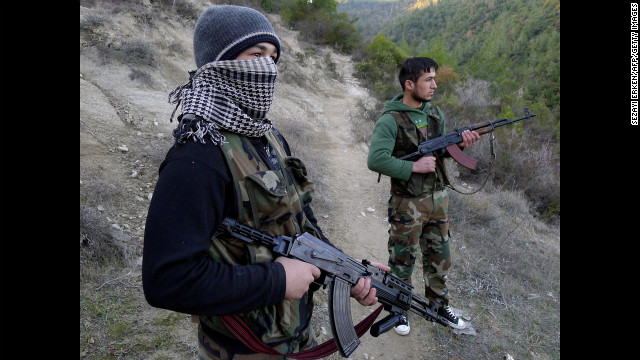 Members of the Free Syrian Army stand in an valley near the village of Ain al-Baida, close to the Turkish border, on December 15, 2011.
Members of the Free Syrian Army stand in an valley near the village of Ain al-Baida, close to the Turkish border, on December 15, 2011. 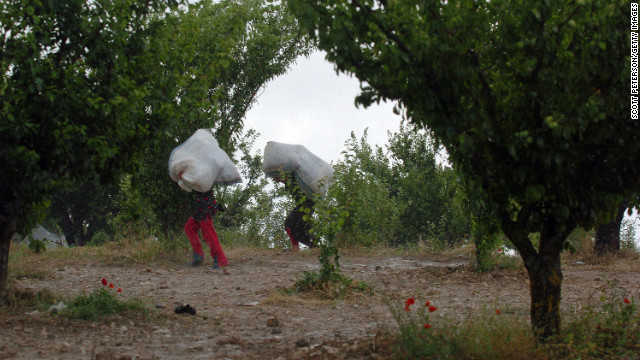 Displaced Syrian refugees walk through an orchard adjacent to Syria's northern border with Turkey on June 14, 2011, near Khirbet al-Jouz.
Displaced Syrian refugees walk through an orchard adjacent to Syria's northern border with Turkey on June 14, 2011, near Khirbet al-Jouz. 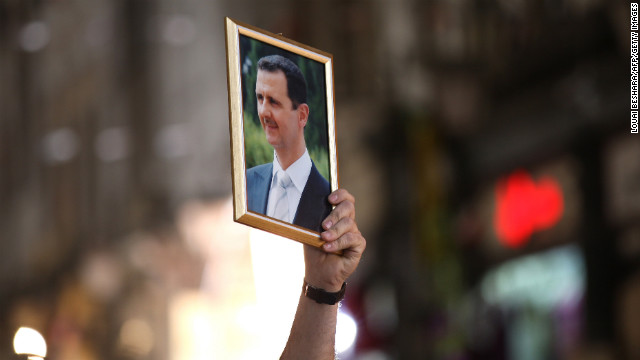 A Syrian man holds up a portrait of President Bashar al-Assad during a rally to show support for the president in Damascus on April 30, 2011.
A Syrian man holds up a portrait of President Bashar al-Assad during a rally to show support for the president in Damascus on April 30, 2011. 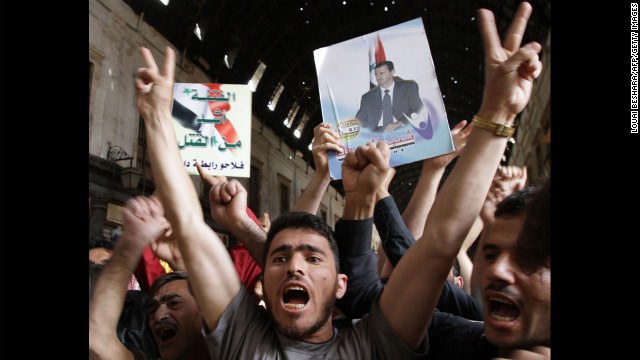 Syrians rally to show their support for President Bashar al-Assad in Damascus on April 30, 2011.
Syrians rally to show their support for President Bashar al-Assad in Damascus on April 30, 2011. 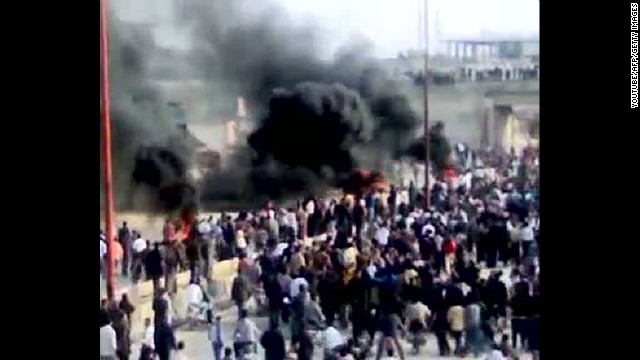 A screen grab from YouTube shows thick smoke rising above as Syrian anti-government protesters demonstrate in Moaret Al-Noman on April 29, 2011.
A screen grab from YouTube shows thick smoke rising above as Syrian anti-government protesters demonstrate in Moaret Al-Noman on April 29, 2011. 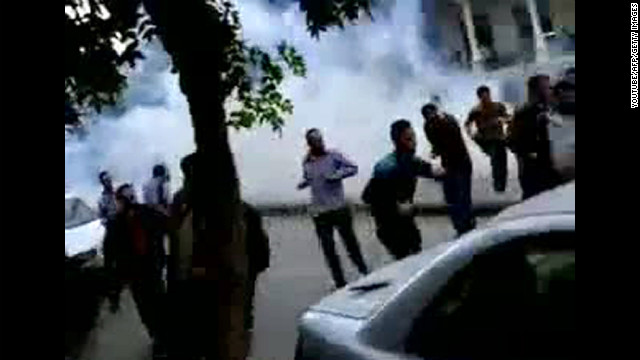 A screen grab from YouTube shows Syrian anti-government protesters run for cover from tear gas fired by security forces in Damascus on April 29, 2011, during the "Day of Rage" demonstrations called by activists to put pressure on al-Assad.
A screen grab from YouTube shows Syrian anti-government protesters run for cover from tear gas fired by security forces in Damascus on April 29, 2011, during the "Day of Rage" demonstrations called by activists to put pressure on al-Assad. 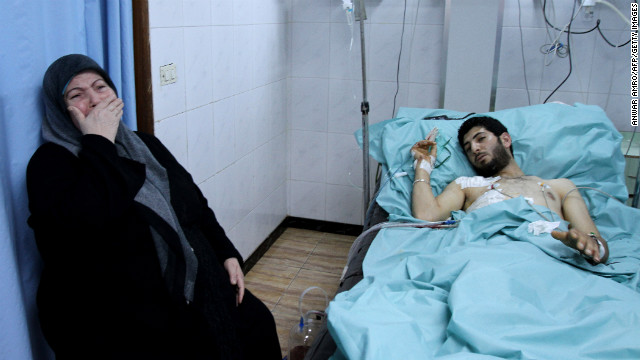 Syrians wave their national flag and hold portraits of al-Assad during a rally to show their support for their leader in Damascus on March 29, 2011.
Syrians wave their national flag and hold portraits of al-Assad during a rally to show their support for their leader in Damascus on March 29, 2011. 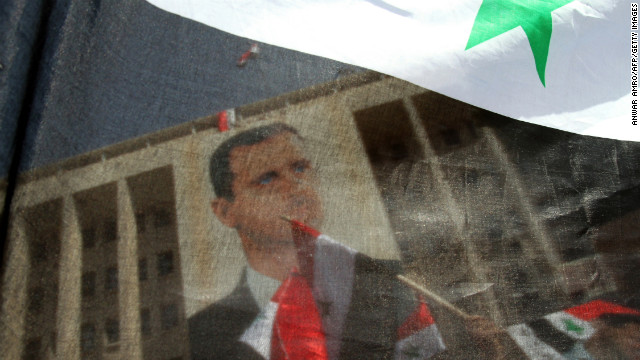 A woman sits by the hospital bed of a man allegedly injured when an armed group seized rooftops in Latakia on March 27, 2011, and opened fire at passers-by, citizens and security forces personnel according to official sources.
A woman sits by the hospital bed of a man allegedly injured when an armed group seized rooftops in Latakia on March 27, 2011, and opened fire at passers-by, citizens and security forces personnel according to official sources. 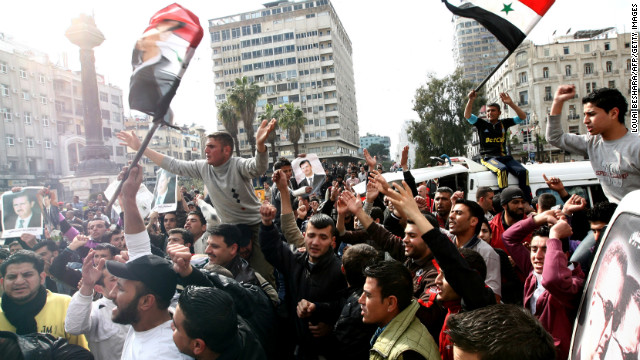 Syrian protesters chant slogans in support of al-Assad during a rally in Damascus on March 25, 2011.
Syrian protesters chant slogans in support of al-Assad during a rally in Damascus on March 25, 2011. 
1

2

3

4

5

6

7

8

9

10

11

12

13

14

15

16

17

18

19

20

21

22

23

24

25

26

27

28

29

30

31

32

33

34

35

36

37

38

39

40

41

42

43

44

45

46

47

48

49

50

51

52

53

54

55

56

57

58

59

60

61

62

63

64

65

66

67

68

69

70

71

72

73

74

75

76

77

78

79

80

81

82

83

84

85

86

87

88

89

90

91

92

93

94

95

96

97

98

99

100

101

102

103

104

105

106

107

108

109

110

111

112

113

114

115

116

117

118

119

120

121

122

123

124

125

126

127

128

129

130

131

132

133

134

135

136

137

138

139

140

141

142

143

144

145

146

147
- Newt Gingrich: President did right thing but picked wrong topic
- David Frum: The more important questions are: "Why?" and "For whose benefit?"
- Frida Ghitis: Inaction on Syria is more dangerous, potentially riskier and costlier
Editor's note: Congress is debating whether to give President Obama authorization for military action in Syria after U.S. intelligence reports say "beyond any reasonable doubt" that President Bashar al-Assad used chemical weapons against his own people. According to Secretary of State John Kerry, at least 1,429 Syrians were killed, including hundreds of children. CNN contributors and analysts offer their views on whether it makes sense for the U.S. to intervene.
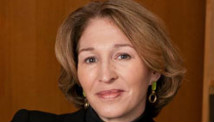
(CNN) -- Anne-Marie Slaughter: Support Obama on Syria
In his 2008 inaugural address, Obama called for a new era of responsibility in this country, "a recognition ... that we have duties to ourselves, our nation and the world." We have those duties not because the United States has some unique role or mission in the world, but because we are the world's most powerful nation. Other nations take their cues from our action or inaction, whether we want them to or not.
If we do not act, we are signaling that the world has suddenly become a far more permissive and dangerous place, that taboos can be broken, and that despite the pious words of the international community, leaders can do whatever they like within their own borders.
If we lead, other nations that take their responsibilities seriously as great powers will join us. Read more...
Anne-Marie Slaughter is president and CEO of the New America Foundation . She was director of policy planning in the U.S. State Department from 2009 to 2011.
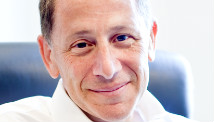
David Rothkopf: Obama, ignore the polls on Syria
Most Americans don't want the United States to launch military strikes against the Syrian government. A recent ABC News/Washington Post poll says 59% of the American people oppose such an intervention, while 36% support it. Even more oppose supplying weapons to the Syrian rebels, with 70% against and 27% in favor.
Many have welcomed President Barack Obama's move to bring the decision before Congress as giving the issue the kind of national debate it deserves. And hearings this week may move the needle of public opinion to give the president more confidence that he has the backing of U.S. voters. Read more...
David Rothkopf writes regularly for CNN.com. He is CEO and editor-at-large of the FP Group, publishers of Foreign Policy magazine, and a visiting scholar at the Carnegie Endowment for International Peace . Follow him on Twitter.

Gloria Borger: Obama's irony, McCain's agony
All presidential decisions are, in the end, difficult and complex. And under any circumstance, the decisions on issues of war (surgical strikes included) are agonizing. The decision to use force -- the repercussions, the cost in blood and treasure, the geostrategic implications -- is complicated and the implications obviously immense.
But as the Syria story unfolds, there is an almost Shakespearean drama beneath the surface -- one of political careers made and broken, of past positions held and almost abandoned. Not to mention the political enemies now finding themselves -- awkwardly -- on the same side of history. Read more...
Gloria Borger is a chief political analyst at CNN.
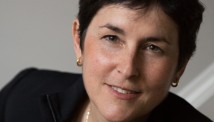
Frida Ghitis: 5 reasons the U.S. must intervene in Syria
Syria feels far away; a tragedy, no doubt, but to many who strongly oppose any kind of intervention, it is simply too removed, too complicated, too foreign to view as an American problem. Military action, the skeptics rightly say, has consequences, often unpredictable ones. But so does inaction.
Inaction is more dangerous -- potentially riskier and costlier -- than smart, limited intervention. Syria may seem far away, but every passing day, every calamitous, explosive, hate-infused day, makes it more America's -- and the world's -- problem. Read more ...
Frida Ghitis is a world affairs columnist for The Miami Herald and World Politics Review. A former CNN producer and correspondent, she is the author of "The End of Revolution: A Changing World in the Age of Live Television." Follow her on Twitter: @FridaGColumns .
Opinion: Don't use Syria to pump up Pentagon spending
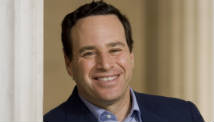
David Frum: Questions for backers of Syria mission
A war between Bashar al-Assad's regime, Hezbollah and Iran one side and al Qaeda-style Islamic radicals on the other is a fight in which the United States has no dog.
Hurting the al-Assad regime inevitably means helping the rebels. True, some of the rebels are nicer than other rebels. It's also true that the nasty rebels are the faction likelier to dominate if the al-Assad regime falls.
In June, the nasty rebels and the nicer rebels came to violence over control of strategic checkpoints in northern Syria. The conflict ended with the nasty rebels assassinating one of the top leaders of the nicer rebels and consolidating control over the disputed territory.
So much of the debate about Syria is a debate about "how"? We are in real danger of skipping over the more important questions: "Why?" and "For whose benefit?" Read more ...
David Frum, a CNN contributor, is a contributing editor at The Daily Beast. He is the author of eight books, including a new novel, "Patriots," and a post-election e-book, "Why Romney Lost." Frum was a special assistant to President George W. Bush from 2001 to 2002.
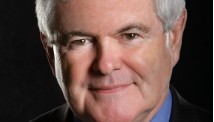
Newt Gingrich: Syria is distraction from real U.S. challenges
President Barack Obama did the right thing in going to Congress for a debate and a vote on a proposed national security action.
He could have followed precedent set by presidents of both parties and launched missiles under his powers as commander in chief. In an America tired by 12 years of continuous warfare (the longest in our history), however, it was wise to engage the American people through their elected representatives in the Congress.
Unfortunately, the president picked the wrong topic on which to have a national debate. Launching a few missiles at Syria is a tactical action that will not change history. Obama has already pledged that he is seeking a limited engagement and is not trying to replace the dictatorship of President Bashar al-Assad. Read more ...
Newt Gingrich is the new co-cost of CNN's "Crossfire," which makes its debut on Monday.
Opinion: GOP shouldn't bail out Obama's floundering foreign policy
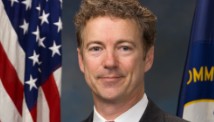
Rand Paul: Obama, don't rush into war
From a strategic standpoint, there are three questions that should always be asked and sufficiently answered before going to war: What is the U.S. national interest? What is the military objective? What is the exit strategy? Concerning Syria, these questions not only haven't been answered, they haven't even been asked.
War should never be treated as a crapshoot. Our troops deserve better. America deserves better. Read more ...
Rand Paul, a Republican, is a U.S. senator from Kentucky.

Fareed Zakaria: Obama team has mishandled Syria
I don't think that this strike, should it eventually take place, will be as damaging as its critics fear. The al-Assad regime will likely hunker down, take it and move on. It will make little difference one way or the other. But the manner in which the Obama administration has first created and then mismanaged this crisis will, alas, cast a long shadow on America's role in the world. Read more ...
Fareed Zakaria is the host of GPS, which airs Sundays at 10 a.m. and 1 p.m. ET on CNN.

Peter Bergen: Obama, a realist and risk-taker
We can be sure that in the next days, the administration will make the argument that if you let Syria take a pass on its large-scale and repeated use of chemical weapons, you can forget any chance of slowing or ending Iran's nuclear program, something that is a matter of great importance for much of the Republican Party.
For those on the left of the Democratic Party in Congress who are generally skeptical of U.S. military actions, Obama can essentially ask, "If not now, when?" At what point will self-described liberals intervene to stop the use of weapons so vile that they have been banned by the civilized world for almost a century? Read more ...
Peter Bergen is CNN's national security analyst, a director at the New America Foundation and the author of "Manhunt: The Ten-Year Search for bin Laden -- From 9/11 to Abbottabad."
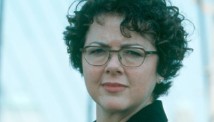
Laurie Garrett: Chemical weapons are a nightmare for Syrians
According to Vice President Joe Biden, there is "no doubt" that chemical weapons were used by the regime -- and not, as the al-Assad government has claimed, by rebel forces.
The victims suffered terrible and painful deaths. Many experts are concluding that most likely, a nerve agent such as sarin was deployed. Sarin is a type of organophosphate, a class of chemicals used for making herbicides, insecticides and nerve gases.
The effects of sarin and other organophosphates on the human body are profound and shocking and can be long-lasting. Some exposures have left the surviving victims paralyzed for weeks, with perhaps permanent liver malfunctions and lingering neurological dysfunctions.
Organophosphates disintegrate in a matter of hours. But during their comparatively brief period of volatile danger, the deadly molecules can pass through human skin, nostrils, lungs and eyes to enter the bloodstream and then the brain. If enough of it gets inside the brain to saturate the nervous system, an agonizing death follows. Read more ...
Laurie Garrett is senior fellow for global health at the Council on Foreign Relations and a Pulitzer Prize-winning journalist.
Opinion: The only road to peace in Syria

Alex Castellanos: GOP shouldn't bail out Obama's floundering foreign policy
Our president is lost at sea again, in an ocean of equally bad options.
This president is an intellectual. He seems to believe war is the failure of lesser minds to find a reasonable alternative. Does President Barack Obama take America to war in Syria when, by disposition, such barbarism is not in him? Or does our president do nothing, permitting the continued slaughter of innocents while Bashar al-Assad dances across the bright "red line" painted by the leader of the free world?
Bad options all around. It was not out of character for this uncertain man to leave even his cherished golf game to reverse the course his secretary of state charted only 24 hours before. Read more...
Alex Castellanos, a CNN contributor, is a Republican consultant and the co-founder of Purple Strategies. Follow him on Twitter: @alexcast

David Gergen and Michael Zuckerman: On Syria, Obama must show strong grip
For Obama, it is also possible that the delay for a congressional vote will one day be seen as tactically shrewd.
Already, he is receiving more help internationally. Saudi Arabia has come out publicly for military action, the Arab League has toughened its stance, and the NATO secretary general has now called for punishment of the al-Assad regime for using chemical weapons. Obama's trip to the G-20 next week gives him a chance to round up more support.
But there is no doubt that he and his team still have a lot of work to do to convince the skeptics, and nowhere is that more important than with the American public. Members of Congress know full well how uneasy many of their constituents are. They will soon be demanding that the president win over more of the public as a price for their own support. There is a good chance we will hear an address from the Oval Office on the eve of congressional voting. Read more ..
David Gergen is a senior political analyst for CNN and has been an adviser to four presidents. He is a professor of public service and director of the Center for Public Leadership at Harvard University's Kennedy School of Government. Follow him on Twitter . Michael Zuckerman, David Gergen's former research assistant, is on staff at the Kennedy School and will be entering Harvard Law School.
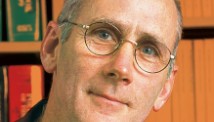
Patrick M. Regan: Syria strike would put peace further out of reach
An attack on the Syrian military by the United States would send a message to al-Assad, but it is not clear if Obama has any strategic objective beyond that. Whether he has such a plan or not, any U.S. attack will have implications for the civil war, no matter how much Obama says otherwise. Read more...
Patrick M. Regan is a professor of peace studies and political science at the Kroc Institute for International Peace Studies, University of Notre Dame. He is the author of "Civil Wars and Foreign Powers" (University of Michigan Press, 2000) and "Sixteen Million One" (Paradigm, 2009), which examines the causes, consequences and possible solutions to civil wars.
William Hartung: Don't use Syria to pump up Pentagon spending
Using Syria as an excuse to hold off on Pentagon cuts would be an endorsement of the tens of billions of dollars in waste that exist in the current Department of Defense budget. And it would postpone a long overdue reshaping of the U.S. military to address a world increasingly dominated by non-traditional threats like cyber-attacks, climate change, epidemics of disease, and the spread of nuclear weapons. Read more...
William D. Hartung is the director of the Arms and Security Project at the Center for International Policy . Follow him on Twitter: @WilliamHartung
Follow us on Twitter @CNNOpinion.
Join us on Facebook/CNNOpinion.
The opinions expressed in this commentary are solely those of the authors.







